Fundamentals of Care framework

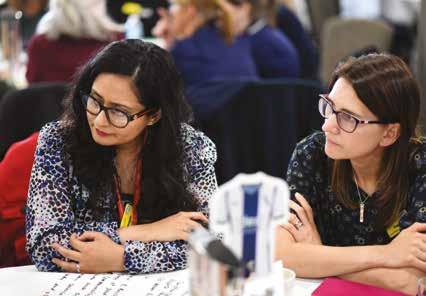
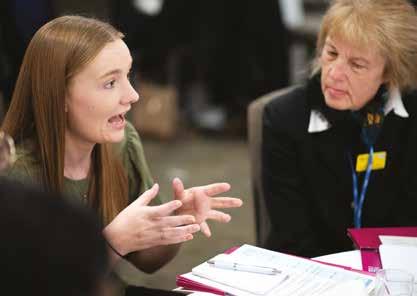
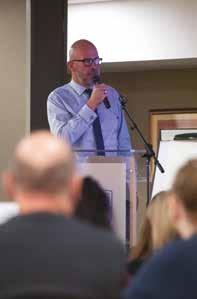
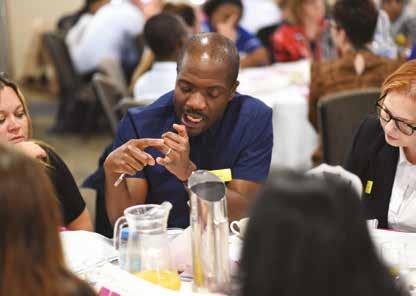 The pulse of community health, Leasowes, Rowley Regis, City Hospital, Sandwell General and the Midland Metropolitan University Hospital
The pulse of community health, Leasowes, Rowley Regis, City Hospital, Sandwell General and the Midland Metropolitan University Hospital
Issue 157 September 2022 Sandwell and West Birmingham NHS Trust My part in Midland Met Page 14 Going to work saved my life Page 20 National Staff Survey is open Page 5 International recruits thrive in community nursing Page 24
launched Pages 16-17 Colleagues share their thoughts at the Fundamentals of Care launch event in September
FROM THE CHAIR
Sir David talks about…Your views count –have your say
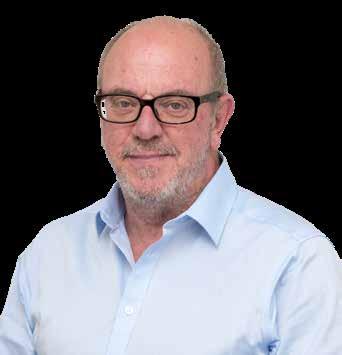
Welcome to the September edition of Heartbeat.
This month, we're celebrating the launch of our Fundamentals of Care approach: you can see coverage of the recent event on pages 16-17, as well as reading about Imaging and Pathology's goals on page 23.
Following the launch of the National Staff Survey, we've included responses to some common FAQs on page 5 and outlined some Pulse survey findings on page 4. We've also launched My Part in Midland Met, a regular piece which focuses on colleagues and their roles in the programme.
Enjoy
Contact us
Communications Team
Ext 5303
swbh.comms@nhs.net
Communications Department
Ground Floor, Trinity House Sandwell Hospital
Published by Communications Team
Sandwell and West Birmingham Hospitals NHS Trust
Designed by Medical Illustration, Graphics Team
Sandwell and West Birmingham Hospitals NHS Trust
Submit an idea
If you’d like to submit an idea for an article, contact the communications team
Ext 5303
swbh.comms@nhs.net
Stay updated
We send out a Communications Bulletin via email every day and you can now read Heartbeat articles throughout the month on Connect. Don't forget you can follow us on:
This month every single colleague in the Trust will have the chance to fill in one of the national NHS staff surveys. We have spent a lot of time this year looking into the feedback we receive from staff through this survey, the quarterly Pulsecheck survey and other staff feedback systems. I know that our group leaders have been holding regular sessions for all staff to share themes, hear about suggestions for improvement and report back on what changes have taken place as a result.
This year I am really hoping that every staff member takes the time to fill in this survey. It is of paramount importance to me, to the Trust Board and to all leaders in the organisation, to understand how you feel about your job and our organisation. The benefit of the national staff survey that takes place at the same time each year is that it enables us to see the impact of any changes on your own experiences, and importantly it enables us to see how we compare to other NHS Trusts. This helps us identify where we need to do better, and how we can improve our Trust as a place to work and build a career.
Our aim is for all colleagues to enjoy their work, feel valued and have pride in our organisation. This year, your feedback so far indicates that we are heading in the right direction but we still have a way to go.

Please take the time this month to complete your staff survey. It won’t take more than 20 minutes and your manager will support you and give you time to fill it in. If you are having problems with this then do get in touch so we can help. Your views count and they will make a big difference to the areas of improvement that we choose to prioritise.
The whole Trust Board is looking forward to seeing the results so that we can continue to build on your experiences and deliver changes for all staff through our Trust People Plan.
Thank you in advance for your cooperation and for sharing your views.
Sir David Nicholson KCB CBE, Chair
HELLO
Dangers of “laughing gas” drug warn Trust’s clinicians
Users typically inhale by filling a balloon with laughing gas.
The effects can be devastating, with both Dr Nicholl and Dr Pucci seeing patients with spinal cord damage and an inability to walk.
Nitrous oxide can inactivate vitamin B12, which is essential for healthy nerves, Dr Pucci explains.
“Patients have symptoms including pins and needles, numbness, electric-shocktype symptoms in their hands, arms, feet and legs, while the most severe cases have damage to the spinal cord, when they can’t walk,” he said.
“They tend to be young adults that are otherwise generally fit and healthy, they don’t tend to be hardened drug users on other drugs. The average age in the patients we have seen is 22.”
With the recent wave of nitrous oxide highs seemingly driven by young adults between 18 and 30, some suspect social media is one potential factor behind the increase.
Two of the Trust’s clinicians have stepped into the media spotlight to raise awareness about the rise in cases of nerve damage linked to the use of nitrous oxide.
We’ve seen a marked rise in admissions – from six patients between 2015 to 2020, to now roughly one every two weeks.
Both neurologist Dr David Nicholl and toxicologist Dr Mark Pucci have been talking to the media about the serious harm the substance can have on users. Dr Pucci said: “Even when we had around one admission per year, that was felt to be frequent.

“But in the past year or so there has been an exponential growth in hospital admissions. We’re now seeing one admission every two weeks or so.”
Like Dr Pucci, Dr Nicholl sees only the most severe cases, with one of his patients still relying on crutches to move 18 months on from admission, despite being young and otherwise healthy.
He fears there could be far more, less severe cases who need treatment elsewhere.
“This is something I rarely saw in the past ten years, but it has gone through the roof over the past two, and it’s getting worse,” he said.
“At the beginning of the pandemic, we were seeing around two admissions every two months and now it’s almost weekly. I’m seeing patients with life-changing neurological injuries.
“And there will be others who we don’t see in primary care of other emergency departments.”
Searching for terms such as ‘Smartwhip’ and 'Goldwhip' on TikTok or Twitter produces videos and pictures of users fainting or sustaining other injuries.
Dr Nicholl believes boredom that came about over several lockdowns led many to take up balloons, which then turned into a habit – so much so that he sees even patients who have lived the worst effects take it up again after leaving hospital.
On the other hand, a lack of awareness around the gas’ effects can lull users into a sense that they are taking up a safe drug, Dr Pucci said, which can become a “psychological addiction.”
But what many experts single out as the most significant factor is the apparent ease with which even teenagers can get hold of nitrous oxide cylinders.
Dr David Nicholl who has been vocal about the dangers of laughing gas drug nitrous oxide
3
CORPORATE AND GENERAL NEWS
Wellbeing Want to relax and unwind in a safe place? Visit the Wellbeing Sanctuary and enjoy a range of free treatments including a massage, meditation and relaxation hypnotherapy. Call 0121 507 5886 to book your free session today.
One
and 70 per cent of respondents agreed with this.
Other improvements showed that our engagement score has improved every quarter that we have carried out the survey since July 2021
Pulse survey results: Respondents believe care high priority for SWB
But more colleagues need to participate in these surveys so any changes that are implanted are a true reflection of how colleagues really feel.
CORPORATE AND GENERAL NEWS
combined, provide an overall score for staff engagement.
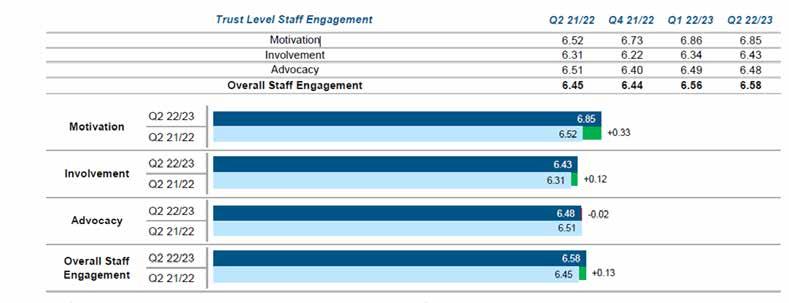
One of the questions is around the care of patients being a priority for the organisation and 70 per cent of respondents agreed with this.
The quarterly clinical group listening events continue to take place; please do take part when you receive an invitation. Details of events are also shared in the daily communications bulletin and on Connect. You can see recordings of previous events on Connect.
Thank you to those of you who took the opportunity to give your feedback on how you feel about working at SWB in the last quarterly Pulse survey.
Twenty one percent (1,615) of colleagues responded to the survey that was open during the month of July.
Other improvements showed that our engagement score has improved every quarter that we have carried out the survey since July 2021.
The quarterly clinical group listening events continue to take place so please do take part when you receive an invitation. Details of events are also shared in the daily communications bulletin and on our intranet site, Connect along with all of the Pulse survey findings. You can also see recordings of previous events on Connect.
The Pulse survey findings are also available on Connect. Managers will review the findings with you and adapt going action plans. Speak to your manager about the findings and contribute to discussions within your team meetings.

All colleagues are invited to take part in the Pulse survey and there are nine core questions that, when the scores are
But more colleagues need to participate in these surveys so the changes that are implemented are put in place based on an accurate reflection of how colleagues really feel.
Managers will review the findings with you and adapt going action plans. Speak to your manager about the report for your area and contribute to discussions within your team meetings.
4
of those questions is around the care of patients being a priority for the organisation
NHS Staff Survey is open –share your thoughts confidentially
Each year every organisation in the NHS has the opportunity to take part in the national Staff Survey where colleagues across the country can feedback on how they feel about working for their NHS organisations.
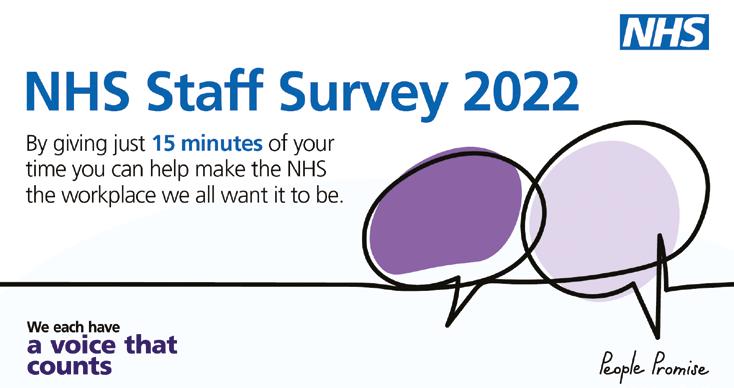
At SWB colleagues also have the opportunity to feed back during the quarterly Pulse survey, however, the findings of the national survey are what national decision makers use to help set priorities for organisations As such it is very important that colleagues at SWB are heard when decisions are being made at a national level.
The results of the national survey are published so we are able to compare ourselves against other similar organisations.
All our surveys are administered by a third party organisation, Quality Health. Many of you will have received an invitation to complete the survey via email to your NHS account from insightandfeedback@iqvia.com
Colleagues in catering, transport, portering and domestic/ward services will have received paper copies with a freepost envelope to send the feedback straight to Quality Health.
Confidentiality
A common issue that arises about the staff survey is concern over confidentiality – often colleagues are under the misconception that their individual responses will be identifiable to the Trust.
Please be assured that Quality Health ensure that individual responses are not visible to
the organisation. Here are answers to some frequently asked questions:
How confidential is the process?
The survey process is entirely confidential with all responses being collated directly by Quality Health. All staff invited to participate via a paper questionnaire are provided with a pre-paid envelope to ensure that all responses come directly back to Quality Health’s secure facility in Derbyshire. All staff invited to participate via email are provided with a unique link to access the questionnaire and all responses are entered directly back into Quality Health’s secure online web survey portal, which only Quality Health has access to.
Why are barcodes assigned to my survey? The main reason there are barcodes on the questionnaire and unique links for the online system is to achieve the highest response rate possible. This can only be achieved if those who do not respond are reminded to do so and the barcode/unique link enables Quality Health to record who has responded in a confidential way, so reminders are only sent to those who haven’t yet responded.
Will SWB know who has or has not responded to the survey?
Quality Health are not allowed to provide information about who has or hasn’t responded to anyone at SWB; and more importantly, they are not allowed to provide information about how an individual has answered their questionnaire. This would be a breach of Data Protection regulations and their contractual obligations as an approved contractor – a responsibility they regard with the utmost importance.
CORPORATE AND GENERAL NEWS
How do I know my responses are anonymous?
Responses collated can only be presented back to SWB in an anonymised way, where Quality Health group all responses received for each organisation together to give counts and percentages against each question. Quality Health are permitted to provide breakdowns of the data by variables such as directorate, department, staff group, etc. However, they are bound by very strict suppression rules to ensure they only present data for groups of 11 people or more. Therefore, if you work in a department with less than 11 people, or less than 11 people in your team respond, this data would be protected and could not be released.
Where staff have made written comments, Quality Health anonymise these so responses cannot be traced back to the individual who has written them.
What happens to my data after the survey is closed?
All personal data is destroyed three months after the survey closes, and no one outside Quality Health has access to it. It isn’t sold, sent abroad, or copied in any way.
Quality Health operates a confidential helpline for the survey and if you have any other queries or concerns, please do contact them directly on 0800 783 1775 or helpline@quality-health.co.uk
5
Raising our game with cardiovascular disease research
Sandwell and West Birmingham has one of the highest levels of cardiovascular disease in England. In order to raise awareness as part of cardiovascular disease month, we would like to highlight how the Trust is working to improve the statistics.
Heartbeat caught up with senior research nurses Sibet Joseph and Paddy Donaghy along with Professor Derek Connolly, our director of research and development, who is also a consultant cardiologist.
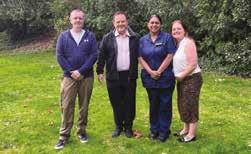
Prior to starting in his research role, Paddy spent six years on our coronary care unit treating patients with heart attacks. “There is no doubt that many heart attacks are preventable,” said Paddy. “We are making big strides in getting people to stop smoking and that has had the biggest effect in reducing heart disease over the last 20 years.”
Sibet has undertaken many heart studies
with Professor Connolly and they have looked especially at cholesterol, developing many new therapies to lower cholesterol levels that are now used in clinical practice. “There have been great strides in the research of cholesterol,” said Sibet. “But we need to keep going and we are about to start several more studies looking at new targets such as Lipoprotein (a) which runs in families and is particularly prominent in several of our wonderful ethnic communities.”
Professor Connolly said our Trust research department has been part of delivering several major studies which have developed new therapies to reduce the risk of cardiovascular disease.
He stated: “Heart attacks and strokes can devastate lives and we know that they are the biggest cause of death in our area. One of the key things that is important is that many studies are undertaken on caucasian populations, and it is imperative that we make all research available to our minority ethnic communities. This will ensure that the therapies work just as well in those groupings.
“We have shown during the pandemic that the Trust can be a real world leader in research but it is now time to get back to our fundamental diseases such as heart disease so we can find new treatments and cures for patients going forward.”
SWB has been very fortunate to receive a donation of nearly £200,000 towards cardiovascular disease research from a grateful patient of Professor Connolly which will help us with our studies. Along with our new Head of Research, Kelly Hard, the whole of the research team are keen to put our patients and population at the heart of our research. If you would like to find out more you can follow The team on their Connect page.
Inspirational ladies lend support to Midland Met fundraising campaign
It is not every day you have the pleasure of meeting a group of ladies who are so committed to doing good for their local community as the Guru Nanak Nam Ladies Charity Jatha UK group.
Recently, the Trust welcomed the group to Midland Met to enjoy a site tour and see how the fundraising they have been doing will impact patients once we open our doors to the public in 2024.
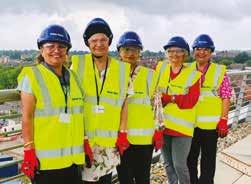
The group is well known to many local organisations as they have made several charitable donations to help support people and groups that need an extra boost. So far, they have supported SWB in several ways, including funding wellbeing packs for colleagues during the peak of COVID-19. Now they are fundraising for us at Midland Met, by enhancing the care our phototherapy device will provide for neonates.
Whilst on site they had the opportunity to see first-hand the progress being made. They visited several areas
including maternity where they looked at a benchmark room and the Winter Garden where they had the chance to enjoy the views overlooking Birmingham.
Nirmal Kaur Notay, Group Lead, remarked: “We chose to support Your Trust Charity because the new hospital is local to us and will benefit our community by providing NHS services to all of us.
“Guru Nanak Ladies Jatha is a local fundraising group, and we collectively decided to support our new hospital. We are a group of Indian Sikh ladies who work with our community to raise money for a variety of projects, and this aligns with our goals as a group. We’ll be providing funds to help provide enhanced care for equipment in neonates.”
Johnny Shah, Head of Your Trust Charity, said: “The Guru Nanak Nam Ladies Jatha have been a valued supporter of Your Trust Charity for many years. We are truly overwhelmed by their fantastic generosity in making further donations to our We Are Metropolitan campaign.
“Thanks to their support, we will make a huge difference in the lives of our critically ill patients and our young patients with high dependency needs. We will also be able to create our very own charity hub at Midland Met, where we will gratefully recognise their support with a plaque. Making Midland Met more than a hospital would not be possible without their support.”
Clinical research team
The Guru Nanak Nam Ladies Charity Jatha UK group enjoyed seeing how Midland Met is developing
6 CORPORATE AND GENERAL NEWS
New clinical research practitioner registration boosts research
the requirements of any study, and are experienced in quickly developing new skills. The work of a CRP and a research nurse can overlap to varying degrees. A research nurse’s role is defined by their professional registration and formal qualification. CRPs come from a range of backgrounds and bring with them a broad range of skills and expertise supplemented by on the job training.
On a day to day basis, the CRP’s role could involve:
• Discussing opportunities to participate in studies with patients and their families.
• Consenting participants to studies.
• Setting up new studies.
• Running clinics where data is collected from participants including blood samples, cognitive and physical assessments and administering questionnaires.
• Processing biological samples.
• Supporting participants and their families to navigate their way through a study.
• Problem solving to improve recruitment and smooth running of a study.
• Data management to ensure data is handled in accordance with research governance.
Clinical Research Practitioner (CRP) is an umbrella title for a family of research roles that have a patient facing element within clinical environments and other health and care settings.
A significant increase in research activity accompanied by a shortage of nurses across the NHS has led to a need to increase and diversify the research delivery workforce.
For this reason, there has been an increase in posts such as research assistants, officers, facilitators and practitioners. The CRP title has been introduced to encompass all of these roles. These patient facing roles have generally been undertaken by nonregistered staff who are increasingly taking on responsibilities that in the past were primarily performed by research nurses.
As a Trust we now advertise all of our research patient facing roles as CRPs and they are open to research nurses, research
allied health professionals and clinical research practitioners in order to widen the pool of applicants and the skills and experience applicants could offer.
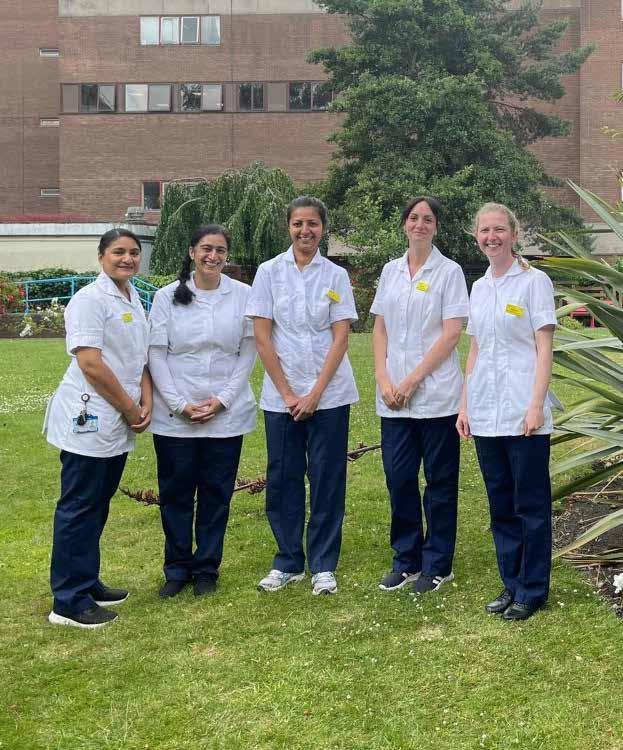
Our CRPs have a combined research experience in excess of 30 years. They have worked across a number of NHS trusts and academic institutions.
CRPs are a vital part of the research workforce, working autonomously and within a team to offer patients the opportunity to take part in research and support them when they choose to participate. This is achieved by working closely with the clinical team and other research colleagues.
CRPs are educated to degree level and above, or have equivalent research experience. Their key strengths lie in being able to adapt quickly to fill gaps between other staff groups in the research workforce. This means they can utilize existing skills and expertise to meet
• Supporting the principal investigators in their role of local oversight of the study.
Many CRPs have been working in research delivery roles for years, but until recently have lacked a formal profession. In 2021, following a significant amount of work by the NIHR and the Academy for Healthcare Sciences, approval was given by the Professional Standards Authority for the Academy for Healthcare Scientists (AHCS) to establish a new part of their accredited register for Clinical Research Practitioners. This has allowed for continued development of professional identity and for the recognition of expertise in a way that it wasn’t previously. It’s also allowed CRPs to think about professional development and will help shape a clearer career pathway.
Meet the Team – Risna Haq, Kiran Rohalu, Jasbinder Kaur, Rebecca Chapman, Rebecca Grenfell
7 CORPORATE AND GENERAL NEWS
Going with the patient flow
Ensuring our patients receive the best care is always a priority, so discharge planning is an important part of quality effective and efficient care. Having patients return to their own home swiftly, or a new and suitable out of hospital environment when they no longer need acute care, promotes the best opportunity for patients to return to meaningful lives with family and friends under the care of the vast and varied community services. These services deliver care directly to the patients in their homes promoting health, treating presenting issues for many longterm conditions.
A patient flow discharge workshop organised by Associate Director of Operations and Resilience Management

Caroline Rennalls for frontline
colleagues was held recently to look at ways to understand, improve and develop the process.
Teams worked together to voice their ideas and shared their own experiences as leads in this area.
Caroline said: “The workshop was to create space where clinical groups and departments involved with discharge planning shared
their experiences, voiced their ideas, and suggested how we can optimise the discharge experience of the patient in both acute and community settings going forward.
“The team worked hard during the workshop to share their patient flow rhythm of the day across groups and services and explored gaps and opportunities.
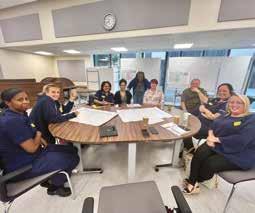
“We looked at what patient flow data we collect, who could see that information and what would be helpful.
“Lastly, we analysed how we could ensure what good patient flow looks like going forward. The engagement of a crosssession of front-line staff who lead on their ward and department discharges generated superb engagement from everyone.
“The ideas and suggestions will be presented to the senior group leadership and chief operating officer to consider the next steps with the ‘we spoke you did’ approach.”
is
Get involved by joining a Schwartz Round as an audience member; join the Steering Group; offer suggestions for a Schwartz Round Topic and putting yourself forward as a Panel Member.

To take part, please email swbh.schwartzrounds@nhs.net
Schwartz Rounds are a forum for clinical and non-clinical staff from all backgrounds and levels, to come together once a month, for one-hour meetings in which staff talk about the emotional and social challenges of caring for patients
Schwartz Rounds will alternate between Sandwell, City and Rowley sites
https://connect2.swbh.nhs.uk/governance/welearn/schwartz-rounds/
Colleagues at the patient flow discharge workshop
Sandwell and West Birmingham NHS Trust
8 CORPORATE AND GENERAL NEWS
Schwartz Rounds® *Light Lunch will be available are starting from October! Look out for the date!
These 1 hour Schwartz Rounds are open to all NHS staff Everyone
welcome
Trust regeneration plans showcased at 2022 Annual General Meeting
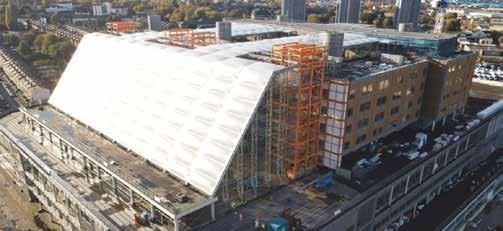 CORPORATE AND GENERAL NEWS
CORPORATE AND GENERAL NEWS
Already the localities surround the new hospital are changing with new housing developments being built. The Trust is working closely with both Birmingham City Council and Sandwell Metropolitan Borough Council on plans to further improve the local area and join up the routes between City Hospital and Midland Met.
Exciting developments surrounding the new Midland Metropolitan University Hospital were highlighted at the Trust’s Annual General Meeting on Wednesday 7 September.
Patients, relatives, people from partner organisations and Trust colleagues joined in the virtual meeting, to hear about the work of the Trust during the 2021/22 year as well as the regeneration opportunities that the Trust is involved in.
During the event, Chairman, Sir David Nicholson introduced the main achievements of the year and described the Trust’s new strategy focusing on our Patients, our People and our Population.
Chief Executive, Richard Beeken shared the Trust’s progress against some key performance measures including the steps the Trust has made in reducing waiting lists that had increased during the COVID-19 pandemic. He highlighted the extraordinary lengths that Trust staff have gone to, in recovering services whilst dealing with the impact of the pandemic on themselves and their families.
During the past few months, the new opening date for the Midland Metropolitan University Hospital has been confirmed as Spring 2024. As well as being a centre for first class healthcare treatment, the hospital will bring additional benefits including a large welcome centre, inviting public spaces for visitors and staff to enjoy and a therapeutic environment where independence is prioritised.
Austin Bell, who is leading the Trust’s participation in these regeneration schemes showed images during the AGM of what some of these plans could look like. One of the main features that will develop after the hospital opens is a Learning Campus on the hospital site that has secured national funding. This campus will be supported by partnering education institutions with opportunities for local people to learn, train and build careers in the health service and within the new hospital.
When speaking after the AGM, Chairman Sir David Nicholson said: “We welcomed all from across the community to our AGM so they could find out how we intend to provide a quality healthcare service across the region through focusing on regeneration to create wealth, access to services and providing healthcare closer to home.”
Protect yourself this winter by getting flu and COVID-19 jabs

This winter, it is expected that many respiratory infections, including COVID-19 and flu, may be circulating at high levels. To help colleagues protect themselves, their patients and families, we are now offering vaccinations at sites across the Trust.
The first vaccinations began during week commencing 26 September, with drop ins only at Sandwell General Hospital. As of 3 October, colleagues have been able to book vaccinations at Sandwell and City, with jabs being offered at Rowley and on community sites from 10 October. The Trust is offering these vaccinations through the occupational health team.
The Covid vaccine will be a booster dose only of Spikevax bivalent Original/Omicron.
You must have had two primary doses of either Pfizer, AstraZeneca or Moderna. Your last vaccine must have been more than 91 days ago and you must be 18 years or over to meet the criteria. The flu vaccine is cell-based quadrivalent influenza (QIVc).
You will be able to have either or both of the vaccines, administered in two separate injections, on the same day. Instructions and information
are being sent in regular communications bulletins; for more information on getting your jabs through the Trust, as well as mythbusting information, visit Connect.
MMUH is a catalyst for regeneration
9
Retired nurse takes on voluntary mission in Nepal
CORPORATE AND GENERAL NEWS
A retired SWB nurse shared her plans to jet off to Nepal to provide medical aid to the less fortunate.
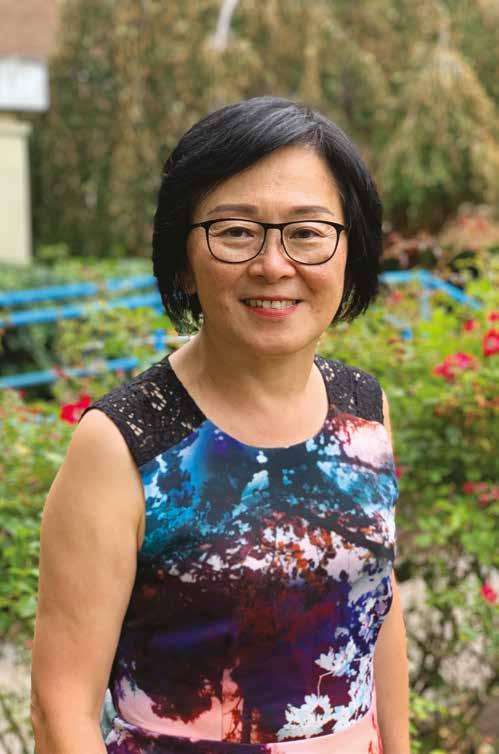
Brenda Lee was a community staff nurse at SWB for 16 years before retiring in 2021, however she remains active as she continues to work on the Trust Bank.
She started her selfless work in 2018, when she first went to Nepal for three weeks - helping to deliver care to poverty-stricken communities after being inspired by a fellow missionary.
Brenda recalled: “When I came back to the UK after my first mission, I knew I had to respond to my calling by using my nursing knowledge to help people. I returned again the following year for a short time.
“I live by the quote ‘if you love God, you can’t not love his people’. My Christian faith is one of my main driving forces for this experience.”
The colleague, who is counting down the days until her trip in October, said: “I will join a mobile medical team (MMT), where we will travel to villages across the town of Tulsipur to visit people who cannot afford to travel to access care.
The MMT project is in partnership with a church in Nepal.
“The aim of the MMT is to improve preventative healthcare to people and in turn, enhance their quality of life.”
This mission is a challenge in more ways than one for colleague Brenda, who is currently learning the language and more about the culture so that she can connect with the community.
She added: “Living in a western country, I am fortunate enough to be in a position where I can give back to others. A lot of people have said to me ‘why don’t you volunteer in the UK?’ but for me, it’s more meaningful to help people where there are less resources.
“Despite some friends and family members being a little worried for me, they’re all very supportive of this venture. My son encouraged me by saying ‘do whatever you’re passionate about so that you don’t have any regrets later in life’. I hope to make my loved ones proud.
“A lot of my friends who have retired use their free time to go on holidays,
Brenda Lee, who will be travelling to Nepal to provide medical aid
and although I do enjoy a nice holiday from time to time, I have a lot of satisfaction in knowing I have done something meaningful for those in need,” she admitted.
Her other motivations include her many years of service at the Trust, where she’s built relationships with her colleagues and patients in long-term community care. She shared: “I’ve known some of my patients for over 10 years, some of them are like family.”
During previous missions to Nepal, Brenda
delivered care to patients on a one-off basis. However, this time she will spend five to six months in one area and will be revisiting the patients to follow up their care and recovery – a factor she enjoys about community nursing back in the UK.
She hopes her story will help inspire people to step out of their comfort zone. She said: “Don’t see your age as a hurdle, instead try to do something good while you still can.”
Good luck Brenda!
10
Partnership working continues to improve care pathways
If people have care or therapy needs, they are discharged when medically appropriate and then assessed in their discharge destination.
This contrasts with the previous models where all assessments took place in the acute ward, causing unnecessary delays. The team utilise a ‘trusted assessor’ approach, where the assessment of a professional from one organisation is used by all others rather than having multiple, often duplicated assessments.
organisations move beyond collaboration and fully integrate.”
A service ensuring safe and timely discharge of patients from acute beds has been one of the main focuses of development by the Sandwell Health and Care Partnership, the place-based collaboration with partners working together to address the needs of the population.
The Sandwell Integrated Discharge Hub (IDH) was formed in 2021 and brings together nursing and therapy staff from Sandwell and West Birmingham NHS Trust with colleagues from adult social care and Place colleagues from Black Country and West Birmingham CCG (now Black Country ICB).
The service has adopted the national Discharge to Assess (D2A) model, which focuses on identifying patients’ likely discharge needs on admission to reduce unnecessary delays.
Since the inception of the discharge hub, the length of stay for people in hospital beds following completion of hospital treatment has reduced considerably, with a current average of 4.5 days compared to 8.7 days three months ago.
In addition, more people are receiving ongoing care in their own homes with approximately 185 people at any one time now receiving intensive care and therapy at home, compared to 90 people 12 months ago.
The Sandwell Health and Care Partnership has collectively invested in ensuring people can receive rehabilitation at home rather than in a community bed with a collective ‘home first’ approach. This is in line with the ambition to create citizen-centred, individualised care.
Daren Fradgley, Chief Integration Officer at the Trust, said: “The Integrated Discharge Hub (IDH) is an early example of the extent at which care for local citizens can improve when

Cardiology: Embracing change with Office 365

gives. The digital SharePoint portal gives all her colleagues easy shared access to all their important worksheets, files, documents at the click of a button, making their jobs that much easier.
Making full use of the full Office 365 suite of tools, the team have also adopted Microsoft Teams using the online chat function to keep in touch, organise meetings and meet remotely.
The partnership is now expanding the Integrated Discharge Hub by creating a Care Navigation Centre (CNC), which will coordinate all health and care needs for people in Sandwell. The CNC will provide advice and direct access for patients, citizens and professionals to ensure people receive the right service at the right time regardless of their age or requirements.
The CNC will be able to provide acute and community healthcare, social prescribing and access to both community beds and domiciliary support for people at home or on discharge from hospital.
It is anticipated that this will result in more timely, successful discharge and the avoidance of emergency hospital care for many people. Currently the CNC is receiving 52,000 calls per month and providing an urgent community response service where on average 76 per cent of people are seen at home with two hours of the initial call. Around 85 per cent of people continue to receive care at home – avoiding a hospital attendance.
Learning to use any new type of technology can be a daunting prospect, however, Professional Development Sister Laura Taylor has instead embraced change and taken on the challenge of transforming Cardiology with Office 365.
Taking on the challenge of embedding a new way of working Laura has taken the lead in setting up a SharePoint area for all her colleagues, taking advantage of the incredible benefits the new system
Laura played a pivotal role in implementing SharePoint just over a month ago. She said: “As we were moving over from our shared drive to SharePoint, it seemed like a logical thing to do as it offered easier access for staff as can be accessed by staff wherever they are, whether they’re at a desk on site, working remotely or even on their phones.
“It also reduces our reliance on paper, as we used to print off all the information and put it into a folder for staff. Information used to
be in hard-to-find share drive folders, which sometimes staff had difficulty in accessing.”
Jody Stubbs, Matron for Cardiology and D27, believes this is an excellent education tool and will only help colleagues who work within Cardiology. She said: It is a fantastic educational page as there are many resources for all nursing staff in Cardiology. It provides a landing platform for our competency packs from HCA to B6, links to training videos, how to guides, links back to Trust training plus much more!
She added: “Visually it is an amazing tool for staff to utilise and stay engaged. We are however planning on getting feedback from those in Cardiology to see if there are any elements staff would like to be added or if there is anything key we have missed.”
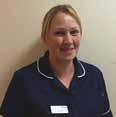 Chief Integration Officer Daren Fradgley
Cardiology Matron Jody Stubbs
Chief Integration Officer Daren Fradgley
Cardiology Matron Jody Stubbs
11 CORPORATE AND GENERAL NEWS
Taking on COVID-19 one jab at a time
CORPORATE AND GENERAL NEWS
Over the past year, the vaccination hub at City Hospital’s Sheldon Block has administered 18,500 COVID-19 jabs – protecting our staff and the community around us from this deadly virus.
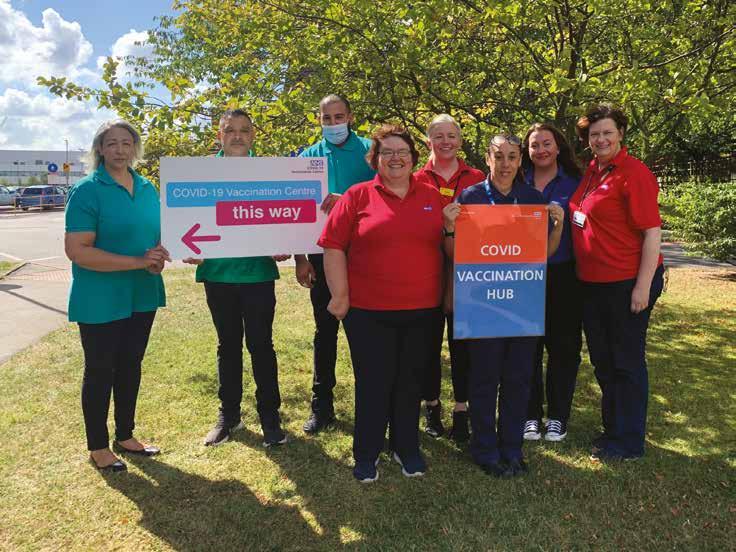
At the forefront of this vital clinic have been Mary Parker and her team who have worked tirelessly through the most challenging times the NHS has ever seen.
Mary was seconded over from her role as falls prevention specialist nurse, to initially head up the vaccination hub at the Education Centre in Sandwell in June 2021. She continued to lead when it moved to its most recent home in Sheldon Block in November 2021.
Earlier in September the hub finally closed with staff moved over to the Tipton Vaccination Centre, which is
based at Tipton Sports Academy.
COVID-19 jabs will continue to be delivered at the venue but the flu vaccination will also be available at the centre.
Reflecting on her time at both Sandwell and City as the clinical lead for the vaccination hub, she said: “The last two and a half years have been extremely challenging but rewarding at the same time.
“My team and I have been ensuring that our population is safe and protected against this virus which makes it all worth it.
“We’ve come up against negativity around the vaccine, but generally people have been very supportive of what we are doing.
“When we first started the hub at Sandwell it was organised chaos. It was set up very quickly and people weren’t comfortable with it at first.
“Doctors were doing the clinical supervision to ensure we treated anyone immediately who had an allergic reaction. We were also trialling different systems as well.
“Pharmacists were there to show us how to reconstitute the vaccination – how to mix it with saline.
“It was very much a learning process for everyone.”
For Mary, leading the hub started out as a three-month secondment, two years later she is still in the role.
“I put myself forward for the role because of my experience as a flu champion. I was joined by others who had also put themselves forward for the same reasons, but as time went on, we were joined by people who were trained up for the role, including the lead chaplain, the Rev Mary Causer.
“It’s certainly been an experience and I’m delighted to continue delivering vaccinations so that our community and staff remain well protected against both COVID-19 and the flu.”
Mary Parker, clinical lead at the Sheldon Block vaccination hub, with her team
12
Youth forum launched to givechildren and young people a voice
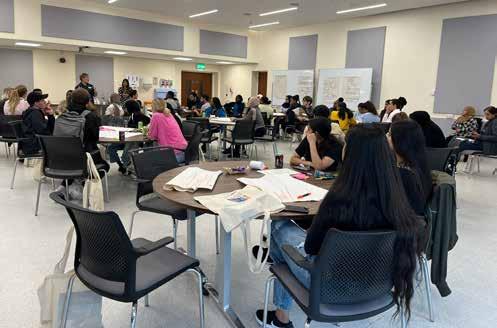

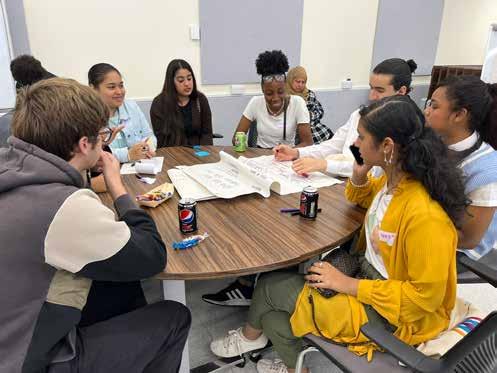
Over 40 children and young people joined colleagues at the Trust earlier this month for the first in a series of Youth Forums.
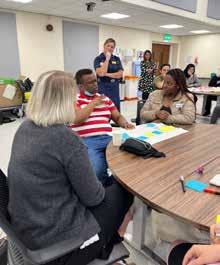
Ensuring the voices of the younger generation are heard, the Youth Forum is set to become a regular event. Launching the first session, Head of Public and Community Engagement Jayne SalterScott said, "Patient and public involvement has no age limit. I like many others think that children and young people should be encouraged and facilitated to participate in decisions about their own care.
“We are hopeful that the youth forum will meet every 4 - 6 weeks and will have the opportunity to discuss healthcare and issues
issues that are important to them such as work experience, volunteering, mental health and deaf awareness. The events will also give the Trust the opportunity to talk to young people about its key priorities such as the Midland Metropolitan University Hospital and the fundamentals of care.”
At our Trust we are working to recruit of several youth ambassadors who will represent the youth forum at key strategic meetings such as the children and young people's board, ensuring the voices of young people are heard and acted upon. There will also be seats available on the children and young people’s board, for the youth ambassadors to represent the wider youth forum. This aims to ensure that the views of children and young people are heard and acted upon.
Sharing her thoughts on the importance of the youth forum, Jayne said, “Children and young people are our patients too. We need to ensure we involve them in their own health care, but also in any service improvements to ensure that our services and facilities are children and young people friendly and enhance the care and experience of our younger patients. We need to systematise and sustain children and young people’s participation in the work of the Trust.”
She added: “As part of our engagement work with young people in the local area, we are currently recruiting members for our first hospital’s young people’s forum so I urge anybody interested to get involved!”
If you are aged 13-21, have an interest in health and want to know more about our healthcare services, the hospital young people’s forum could be for you! We are hosting an engagement event at Sandwell Education Centre on Tuesday 18 October from 6pm – 7.30pm. To find out more and book your place email swbh.engagement@nhs.net or call 0121 507 2671.
13 CORPORATE AND GENERAL NEWS
From now until when we move into Midland Met, we will be sharing updates with you about the many people involved in the project and the role they each play.
The successful opening of Midland Metropolitan University Hospital relies on many people, teams and stakeholders. Once open, it will have a far reaching impactnot only on those we care for but also on colleagues and our community in terms of regeneration, jobs, housing, charitable endeavours, and so much more.

My part in Midland Met
What part does your role contribute to the Midland Met project?
I'm involved with workforce planning for both departments, the design for our security control room and the positioning of cameras, including access control.
How are you preparing for the opening of Midland Met in your team/ department?
We’ve been on site visits to see the space at Midland Met. We are engaging with workforce planning, and regular communication updates are available.
In what ways will our new hospital help to shape your role for the better? I.e., changes to patient pathways/innovative technology/patient wellbeing or inclusion?
The back of house will be more efficient and private for patients when transported from A to B. Our new hospital will also benefit from enhanced infection control by reducing cross-contamination due to less traffic in these areas.
The biggest benefit that Midland Met will bring in your opinion is...
It is our brand new acute hospital that will serve Sandwell and West Birmingham.
Getting us to Midland Met is a team effort. We all have a part to play in making it #morethanahospital!
Zaheer is our portering and security manager responsible for looking after teams across all our sites. As these areas play such a key role in SWB, we caught up with Zaheer to find out about his role in the opening of Midland Met.
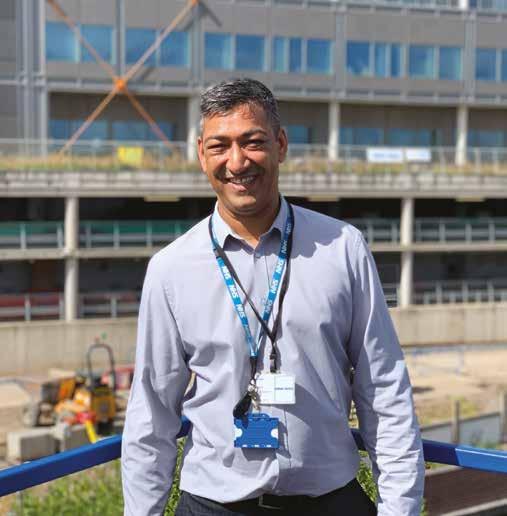
How long have you been at SWB and what is your current role?
I have been at SWBH for four years now. I manage the portering and security teams cross-site.
It will have state-of-the-art facilities, promote regeneration of the areas around the site, and will create jobs on the back of our plans. The possibilities are endless - that is what is so fantastic about this build.
Any other thoughts?
I have visited the site a few times, and I can see massive improvements on each visit. The size of the hospital is breathtaking, and the large windows for the patients and families to admire the views are positive features. The décor is colour coded with fresh light flooding in, and it’s a welcoming environment.
Sandwell and West Birmingham NHS Trust
14 If you have heard any rumours about the Midland Met and you want to know if there is any truth to them, however far-fetched, intriguing or interesting, email the communications team at swbh.comms@nhs.net for an answer.
My part in Midland Met - Zaheer Iqbal
Kelsie overjoyed with team award
Over the past few months, SWB has been working to shape our new vision and values. They will focus on ambition, respect and compassion –everything we embody and stand for as a diverse organisation.
These new values will underpin our work to serve our vibrant communities in and around Sandwell and West Birmingham. Living these values is central to our work, and one person embodying these values already is Kelsie Ralph, HCA.
Recently the nursing and midwifery clinical education team awarded Kelsie their first HCA certificate of recognition for care and compassion. A patient nominated Kelsie for the outstanding care she received from her whilst on ward D21.
Kelsie told Heartbeat: “I received the care and compassion award for the care I gave to a patient I looked after. She said I helped her a lot while in the hospital, I went the
extra mile with the care provided, and I made her feel comfortable and reassured. The patient was a lovely lady who was very worried about the procedures she had to undergo and the news she might have to face after having multiple scans - it was a lot to take in for her.
CORPORATE AND GENERAL NEWS
“When I received the award, I felt very blessed and appreciated. It was a bit of a surprise in a good way as I always try to make patients feel most comfortable and at ease as a hospital stay can be daunting, so I always try my best to do that extra little thing to make someone feel comfortable.”
Kelsie added: “It was such a lovely feeling knowing the patient nominated me and recognised me with this award. She did so well with everything she underwent. Each patient could be a relative like your mom, nan, dad or sibling. I treat each person I look after as I would want my loved ones to be – for them not to feel stressed or not to feel so out of place being in hospital.”
Health and wellbeing team shortlisted for national award
Well done to the health and wellbeing team who have been shortlisted for a national award recognising their support for colleagues during the pandemic!
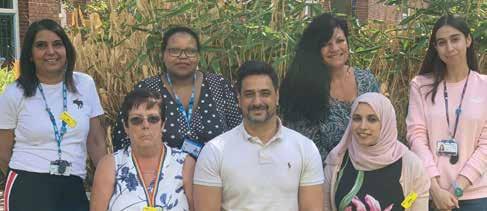
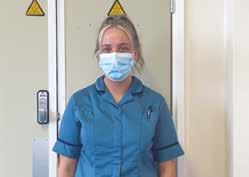
The department are up for the Best Staff Wellbeing Initiative in the Nursing Times Awards.
They developed the enhanced wellbeing support project in response to the physical and mental health challenges faced by staff since the beginning of the COVID-19 pandemic.
Dr Masood Aga, Clinical Director for Occupational Medicine and Specialty Lead for Health and Wellbeing, said: “To have a team with such a passion for staff wellbeing and an aspiration to take it to an entirely new level is a privilege in itself.
“This recognition is so well deserved by the team and the Trust. Our staff are at the forefront of everything we do, as we aim to create a safe environment where every single person feels respected and valued.”
The last few years have come with an abundance of new challenges for many, especially for those working in healthcare. COVID-19 pressures have also impacted at a wider organisational level and increased demand for wellbeing support.
Dr Aga added: “The programme includes a wide range of wellness initiatives and activities to promote and provide early intervention and meaningful support.
“The aim of the system is to identify colleagues who need help early on, improve morale, mental health and wellbeing.”
The project has seen large numbers of staff accessing professional counselling sessions and getting therapy services including massages, meditation sessions and accessing the relaxation pods.
The Trust will be competing against eight other Trusts across the country for the sought-
after award, which will be judged by a prestigious panel - featuring some of the top figures in the health and care profession, alongside several past award winners.
The full list of nominees for the 2022 Nursing Times Workforce awards can be found at https://www.nursingtimes. net/news/leadership-news/shortlistfor-nursing-times-workforce-awardsrevealed-18-08-2022/
The winners will be announced at the prestigious awards ceremony, taking place on 22 November 2022 in London.
Kelsie received the first HCA certificate of recognition from the midwifery clinical education team
Some of our colleagues from the health and wellbeing team
15
Getting back to the basics of care
CORPORATE AND GENERAL NEWS
Going back to basics may sound simple enough - but it is essential when it comes to the care we deliver to our patients.
This is what our Fundamentals of Care framework will address, as many colleagues heard at the official launch of the programme in September.
The day-long event at West Bromwich Albion FC, heard from patients, carers and staff about what mattered to them whilst receiving consistent care from either clinicians at our hospitals or in the community.
But there were also workshops held where colleagues were able to talk about ways they could improve the delivery of consistent care.
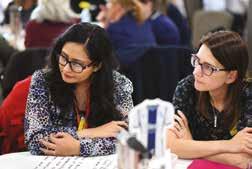
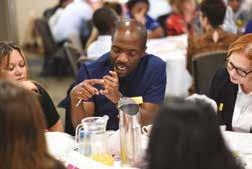
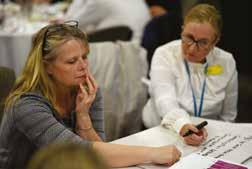
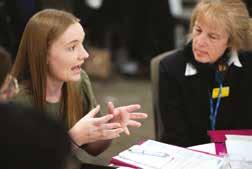
Mel Roberts, Chief Nursing Officer, said: “I want to thank everyone who attended the launch event for Fundamentals of Care. I was delighted with the way everyone was fully committed and engaged with the approach.
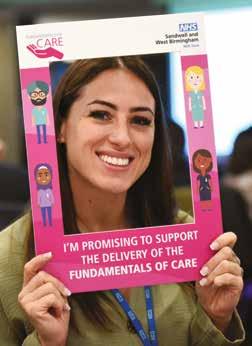
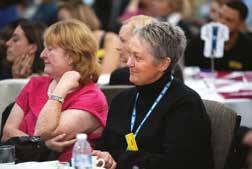
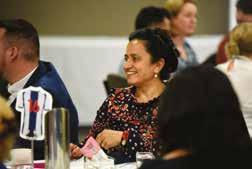
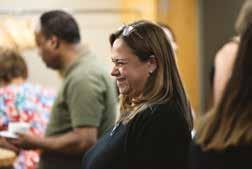

“This really is the start of our journey together and there was amazing energy in the room throughout the day.
“We heard from many during the event - our patients, people and populationabout why it’s so important to get the basics right.
“Now we need to turn that energy into action and work hard to provide high quality patient care.”
Striking a chord with many was partiallysighted Graham Price’s story, who is part of an oral, nutrition and hydration patient focus group at the Trust.
He described how simple things like staff telling him where food is on his plate would help him along with more stable drinking cups or bottles.


Meanwhile carer Jaswinder Kaur Bedi talked about her daughter, now aged 20, who has autism and learning difficulties. She said: “When accessing healthcare I want people to listen to me. When my daughter was younger I noticed she had speech and language issues, but no one listened to me. It was an ongoing issue. She wasn’t diagnosed and healthcare workers didn’t understand our issues we had at home.
“Everything took a long time for us to get help.”
Feedback from colleagues who attended has been positive.
Marsha Jones, deputy director of governance, shared: “What a fantastic day at the Fundamentals of Care Launch. We’ve recognised there is much to do but we have set the vision so we are all heading in the same direction collectively.”
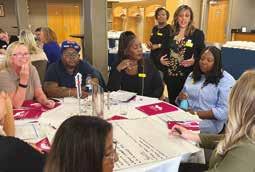

The Fundamentals of Care framework will improve essential standards of consistent care, patient’s outcome and experience and we want to ensure this approach is interdisciplinary, owned by all staff and applied consistently across all areas of care.
We are partnering with the International Learning Collaborative (ILC) who will support the organisation through their world -wide network based in Europe, Australia , New Zealand, North America and Canada.
And we are the first Trust in England to become ILC members and one of the first UK to develop a care delivery model that places the Fundamentals of Care at its heart. Going forward as part of this approach we will establish a service accreditation programme and a Fundamentals of Care steering committee.
There are eight standards currently in
These standards will be finalised for adults, children, maternity and neonates, primary care and any specialist services such as gynaecology, theatres etc. The final standards will be developed in conjunction with staff and patients.
For further information about Fundamentals of Care email saleem.mohammed@nhs.net
 Colleagues at the launch of the Fundamentals of Care framework.
Colleagues at the launch of the Fundamentals of Care framework.
1716
draft as below: 1. Personalised Care 2. Harm Free Care 3. Promoting Independence 4. Nutrition and hydration 5. Sleep and Rest 6. Maintaining Healthy Skin and Continence 7. Symptom management 8. Communication
CORPORATE AND GENERAL NEWS
Dr Nachiappan joins prestigious scholarship programme
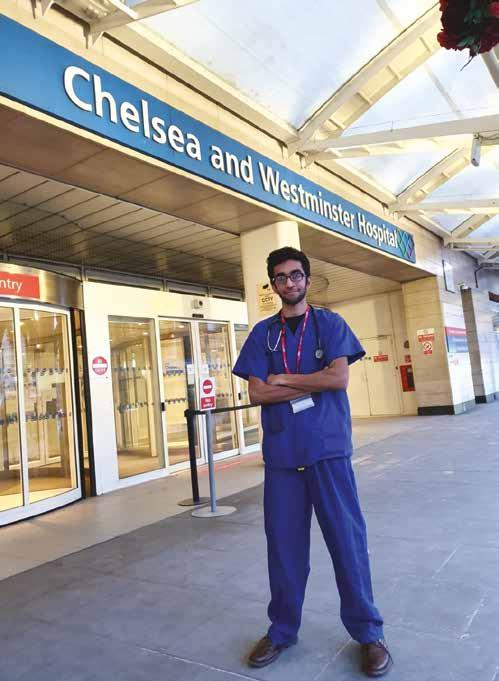
CORPORATE AND GENERAL NEWS
Nitish Nachiappan, FY2 Doctor and Teaching Fellow, has been selected to join the prestigious Healthcare Leadership Academy (HLA) Scholars programme - a prestigious scholarship set up to develop and nurture healthcare leaders of the future.
After completing a rigorous selection process, Nitish will be joining the academy’s cohort for the 2022/23 academic year.
Founded in 2016, the HLA scholarship recognises healthcare students and professionals with proven leadership ability and gives them the opportunity to take their leadership skills to the next level.
The HLA aims to inspire and support healthcare students and professionals to change the world of healthcare through leadership, one small step at a time.
Nitish gained an MBBS from Imperial College London, with a BSc in Global health. He has founded multiple start ups and social enterprise projects which have received international praise.
Speaking about the opportunity, he said: “I'm excited to join the HLA, and I'm looking forward to working with other scholars to create meaningful change in the healthcare landscape.”
The HLA started with the flagship HLA Scholars programme based in London and since then it has rapidly spread across the UK, with cohorts in London, Newcastle, Bristol, Belfast, and Edinburgh, as well as Amsterdam.
It was formed in response to demand from young clinicians and medical students to learn about leadership. The aim of the programme is to inspire the next generation of healthcare professionals and develop their understanding of leadership.
Speaking about this year’s cohort, Johann Malawana, Director of the HLA, said: “After a rigorous and competitive application process, we are delighted to welcome Nitish to our 2022-2023 HLA cohort.
“The pandemic has reinforced the need for leaders who inspire, listen and care. At a time of great global challenge, it is important that the next generation of healthcare leaders are motivated,
inspired, and prepared in order to best look after the populations they serve.”
He added: “We look forward to seeing what this generation of Scholars achieve with the platform they are given through the HLA and its community.”
As part of their role, Scholars are expected to develop a community project over the course of the one-year programme, with previous projects having reached national prominence, winning prizes, publications and presentations at national events including at the House of Lords.
Universities and healthcare organisations where previous scholars have been based
have benefitted immensely from their staff and students becoming scholars. They have developed high profile projects that have had an impact nationally and internationally.
The HLA is approved by The Institute of Leadership & Management, is a certified member of Social Enterprises UK, and is commissioned by Health Education England North East and Health Education England South West.
The HLA partners with Medics.Academy and through Medics.Academy its programme is accredited by the Medical School at the University of Central Lancashire. The HLA is also supported by University College London’s Academic Careers Office.
Dr Nachiappan at Chelsea and Westminster Hospital
18
Trust launches brand new TikTok channel
Last month the communications team launched the brand-new Trust TikTok channel @SWBHNHS, to promote educational content to the younger generation.

Anuji Evans, External Communications Manager said: “I’m really excited to have launched SWB’s new TikTok channel, which gives us the opportunity to create content in a unique way that hasn’t been done by the Trust before.
“I encourage all teams to get involved in making this a success – if you think you’ve got an interesting idea that could work for a TikTok video, please get in touch with comms and we can help bring your idea to life.
“I also urge all to support us by following our account and sharing our content wherever you can.”
As a part of the educational push, the team will be creating a ‘Myths vs Facts’ series to debunk common health myths and inform people on the facts.
The first video of the series was created in collaboration with Anne Rutland, Specialist Skin Cancer Nurse, to target skin cancer awareness. Anne told Heartbeat: “It’s so important that as a Trust, we try to target a variety of demographics when relaying important health information.
“There are many common misconceptions surrounding all things sun and skin. I provided the comms team with some fact and fiction statements about skin cancer and sun damage, which they then converted into a piece of content that made it engaging and easy to understand.
“The videos being created are a great use of social media to get the information out there in a way that is accessible and fun. I would highly recommend other teams to start thinking about TikTok and how they can educate others through the platform.”
The communications team have a lot of exciting videos in the pipeline, working with various teams and departments across the Trust.
A range of videos have already been posted, including a car parking guide, one celebrating Prosthetists and Orthotists Day at Sandwell and behind-the-scenes footage of MMUH.
Head over to the channel https://www.tiktok. com/discover/swbh-nhs-trust to watch the latest videos.
If you or your team think you could be the next SWB TikTok stars, contact the communications team on 0121 507 5303 or via email at swbh.comms@nhs.net
Imaging outline Fundamentals of Care Framework
Fundamentals of Care is SWB’s flagship clinical improvement plan to achieve our strategic objectives.
The framework outlines what is involved in the delivery of safe, effective, high quality care, and what this care should look like in any healthcare setting. Every department across the Trust should be considering what Fundamentals of Care means for them, and how good care looks and feels within the work they carry out.
At the recent Fundamentals of Care event, Group Professional Lead for Imaging and Pathology CJ Browne outlined their approach, considering what this would look like, how they can improve, and how they could evidence this improvement.
She said: "Colleagues are likely to focus on aspects such as state of the art equipment, highly trained staff, and adherence to the relevant guidelines and standards. The patient focus is likely to be on polite communications, improved outcomes and experiences, and the feeling that they are involved in their care. To this end, imaging and pathology have set some goals to improve patient care, focusing on improving communication, considering patients personal, cultural and religious needs, and ensuring both patients and carers are able to access information. Where things may go wrong, they plan on ensuring staff and patients know how to raise concerns: this, in turn, will enable the department to identify, act and support on poor performance and share lessons learned from incidents, complaints and patient feedback.
“We are only able to celebrate success if we are able to evidence it. As such, the team have outlined their approach to providing evidence on change. This includes encouraging patients to provide feedback, including the development of posters with QR codes for instant feedback and setting up patient engagement groups. They will organise services to meet individual needs and provide a greater number of choices for patients. It’s clear that success will be measured and determined by the patients that access the services of the department.”
Trust’s brand new TikTok page
IMAGING
19 CORPORATE AND GENERAL NEWS
Going to work saved my life –Matthew Maguire’s story
MEDICINE AND EMERGENCY CARE
It was meant to be a normal summer's day, however for Matthew Maguire, it would be a day like no other – a day he would come close to losing his life.
Coming in to work at his office at Sandwell Hospital, Associate Director of Performance and Strategic insight Mathew Maguire had no idea he would soon find himself going from staff member to patient, whilst doctors and nurses rushed to treat a life-threatening condition.
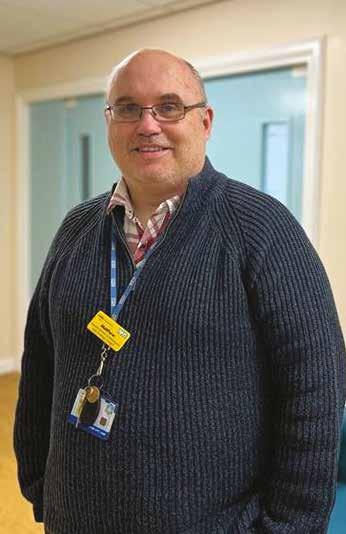
Unbeknownst to Matthew, on this day he would suffer a pulmonary embolism, a condition which occurs when a blood clot gets stuck in an artery in the lung, blocking blood flow to part of the lung.
However, fortunately for Matthew, he works at SWB and was surrounded by quick thinking colleagues who were able to spot that something was not quite right and call for urgent help. And within moments of the call going out, Mathew found himself in the hands of our EMRT team who arrived in his time of need.
“The team were very quick to respond to the emergency,” said Matthew.
“They got a trolley and moved me directly to our A&E department. I have a good relationship with John Bleasdale who was in charge of the EMRT team on that day and though I wasn’t too well at the time, he was able to keep things jovial and lighthearted which stopped me from panicking. Nothing seemed like it was out of the ordinary for them and they were in control of the situation the whole time.”
Matthew was moved from A&E resus to AMU as he was struggling to breathe and required constantly monitoring.
“The nursing staff on AMU showed great patience and understanding with me despite my condition which only made me feel better in their care.
“I must give a special mention to HCA Stuart on AMU A in bay A. It was watching Stuart interact with other patients’ relatives that made him stand out, he made hand puppets for some children whose grandfather had obviously had some bad news and he would help distract the grandchildren so that the grandfather and father could have some quiet time to talk. Though
this was a small touch it really stood out to me and encompassed the great care offered.”
On the whole, Matthew received excellent care from his initial admission to his eventual discharge.
“I would like to say a huge thank you to all the clinical and non-clinical staff who supported me on patient journey as I know how close I came to death. They all cared for me on a professional and personal level, and it
is truly humbling. Simply put, going to work that day saved my life!”
Matthew is currently working from home. He is currently on long term anti-coagulants with a short (three month) to medium term (six month) plan in place for his care.
Everyone at SWB would like to wish Matthew all the best and hope to see him fit and well soon!
Matthew Maguire is on the road to recovery following a health scare
20
Women and child health get hands on at Midland Met
With wards and departments taking shape at Midland Met, this month saw the Women and Child Health leadership team head on to site and get hands on in their soon to be completed new home.
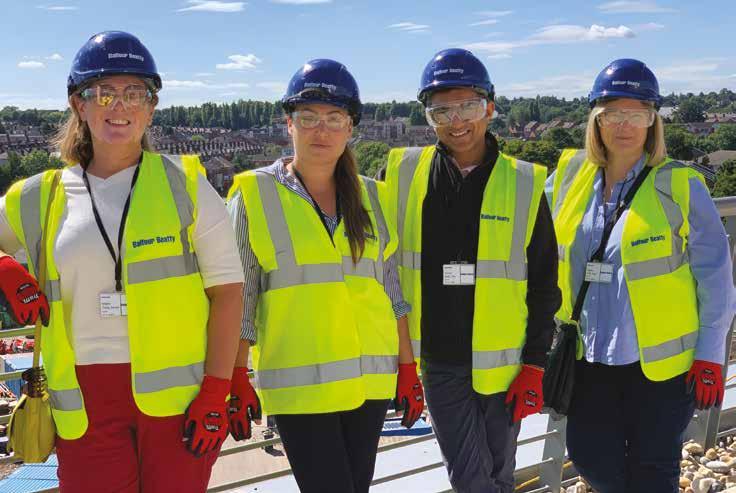
Impressed by the progress and keen to see their new spaces taking shape, the team toured the site to begin planning their big move.
Dr Nick Makwana, Group Director for Women and Child Health, said: “It’s been amazing to see what we’ve been talking about for so long. The space is incredible, and when our colleagues get a chance to see this space, they’ll realise how fantastic it is. The possibilities to enjoy this area will be much welcomed by colleagues - being able to socialise over a coffee in the Winter Garden is something I will look forward to.”
Nick added: “Teams will benefit from working in the big ward areas with natural light. For me, an exciting area is the Winter Garden which doubles up almost as a wellbeing space. It’s a massive area that will house an art gallery. It has lots of open space perfect for events such as dance workshops. Plus, it offers valuable space for our community groups who can use
this area too. The green space is something colleagues will enjoy being able to sit out on in the summer months as well.”
Standing on the balcony of the Winter Garden, Jade Payne, Group Director of Operations, remarked: “It’s a beautiful day to visit Midland Met. I can imagine what it will look like when we open in 2024 with a seating area and being able to use this space to meet with colleagues away from work areas will be an asset.
“I’ve seen level eight, which is near completion, and the facilities look incredible for our patients. I think these modern facilities will enable us to give patients the care they deserve in a welcoming, modern hospital. Colleagues will benefit from working in a new hospital too as some of our existing estate is quite outdated.”
Jade added: “We are reinvigorating the MMUH project teams and boards. Colleagues must start getting involved and feed ideas to their senior managers and leaders to get their thoughts out there. We need to understand any concerns and look at care pathways. It’s a big site, and we need to learn how we can do things differently together. Now is the time to start getting involved.”
Reflecting on what she had seen, Louise
Wilde, Head of Midwifery, said: “The tour was fantastic. I haven’t been on site since 2018, and it’s changed lots. There are complete rooms, the paint is up on the walls, and the flooring is down in some areas.
“We’ve got a state-of-the-art maternity unit, and I’d like to see all our colleagues get involved in the work we need to do to bring this to life for our area.”
Cheryl Newton, Group Director of Nursing, said: “Seeing our new hospital emerging is quite something. We’ve seen the wards shaping up, the paediatrics area and big open spaces for our children, young people and our gynae patients. It looks great and will be a hospital we can all be proud of.”
If you would like to arrange a site tour for your team, please email mmuh.projectoffice@nhs.net
To share any ideas with the women and child health leadership team, please email Claire, Group PA at claire.wilson14@nhs.net
The women and child health leadership team enjoyed the opportunity to see the progress made onsite at Midland Met
21 WOMENS AND CHILD HEALTH
Helen takes on new strategic role in maternity services

WOMENS AND CHILD HEALTH
Following the creation of the Black Country and West Birmingham Integrated Care System (BCWB ICS) in July, Director of Midwifery Helen Hurst has taken up a new role as Clinical Director of Midwifery for the ICS from the beginning of September until the end of March working two days per week.
Talking to Heartbeat, Helen explained what the role for the ICS will involve: “This is a new position where I will work collaboratively within the Black Country ICS strategic workstreams to lead on the delivery of the principles of the National Maternity Transformation Programme.
This means supporting a reduction in health inequalities, perinatal and maternal mortality, and morbidity, and building maternity provision within the system that is future proofed and based on the requirements of our local communities and their demographics.
“I’m also focussed on building resilience within our workforce and ensuring equitable development for all staff. This will ensure we deliver high quality services that share learning across the system and provide assurance against national drivers for improvements to maternity services.
“By taking a strategic lead on the delivery of the national mandated outcomes of the Long Term Plan for maternity and neonatal commitments, Ockenden assurance and perinatal quality assurance model, I can ensure the four providers within the Black
Country ICS are supported to deliver our commitments.
“The four integrated providers with maternity and neonatal services - in addition to ourselves - include Dudley, Walsall, and Wolverhampton. To give some context to how busy maternity services are, last year across the system there were nearly 18,000 babies born – with the highest numberjust over 5,000 - born at our Trust, closely followed by Wolverhampton.
“Factoring in higher than average rates of non-English speaking families, new to the country families and higher levels of teenage pregnancy, especially in Dudley, Sandwell and Walsall, coupled with significantly poorer health and higher than average rates for infant and premature mortality we recognise the challenge to deliver equitable care across all areas.”
Helen Hurst
22
Care Navigation Centre – the control centre for delivering care



The recent launch of the Care Navigation Centre at Sandwell Hospital is set to transform community services with its ‘air traffic control’ model of care, directing patients, professionals and the public to the most appropriate interventions and support, maximising outcomes and reducing delays to care.
The ‘no wrong door’ ethos held by Care Navigation Centre ensures patients are able to access same day emergency care, urgent community response, admission avoidance, community pathways, neighbourhood teams, virtual wards and third sector support ensuring that scheduled and unscheduled care needs are streamed to the most appropriate service pathway without delay.
Implementing one of the core tenets of the NHS’s 10-year plan, namely patients to access care that meets their needs first time, the new centre will also ensure patients are able to access care closer to home, support reduced length of stays and improved patient flow and ultimately provide improved patient experience. To support flow and patient outcomes including avoiding deterioration into crisis again or unnecessary admission, the Care
Navigation Centre’s visible capacity and demand dashboards will enable efficient use of resources and prioritisation of cases to assist in capacity in post urgent community response services.
The Care Navigation Centre will be a multidisciplinary hub providing a key resource for patients and professionals, with urgent calls and referrals being managed by triaging clinical staff assessing clinical requirements. The Centre also provides real time ability to interact with West Midlands Ambulance crews providing viable alternatives to attending hospital. Non urgent cases are managed by a team of administrators following a clear triaging algorithm with input, support, advice and guidance from clinical colleagues.
To find out more about the newly formed centre, Heartbeat spoke to Primary Care, Community and Therapies Deputy Director of Operations Kulwinder Johal, she said, “The Care Navigation Centre provides a single number for access to services to overcome issues, professionals and families experience when trying to access healthcare – calling this single number, 0121 507 2664, will ensure they get the right care without delay, without needing to be forwarded and referred through a chain of intermediaries services.”
PRIMARY
AND

“The service uses a call management system to monitor and manage call volumes, ensuring that we keep wait times to an absolute minimum and critically to ensure that we are able to route calls to the most appropriate service. We also have a direct link with the West Midlands Ambulance Service, where appropriate referrals are passed over to us, avoiding patient convenience to hospital and hence avoiding admissions”.
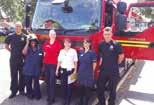
The phase 1 go live of the Care Navigation Centre has provided access to GP’s and West Midlands Ambulance Service to the Urgent Community Response Service 2 hour and Community Admission Avoidance. Access to the Virtual Ward team is going live shortly, so watch this space for more information.
For more information on the Care Navigation Centre, contact Lucille Hedges on 0121 507 2664.
23
CARE, COMMUNITIES
THERAPIES 23 MEDICINE AND EMERGENCY CARE We’d love to hear from you if you have… • An event or special occasion in your department • If you work with an inspirational colleague • Does your department do something that makes a real difference to our patients? Please get in touch if you’d like to be featured in an upcoming edition of Heartbeat! Email swbh.comms@nhs.net to submit your story idea. Have you got a story?
International recruits thrive in community nursing
PRIMARY CARE, COMMUNITIES AND THERAPIES
In May a number of internationally trained nurses joined the Trust and began working in community nursing. Five months on, we catch up with the new recruits as they thrive in their new roles and learn about their experience.
Salina is now in a home she found herself, and travels to work via the bus. As a community nurse, this could be a barrier, but Salina is able to get into work on time and carry out her duties effectively.

Salina Tamang
Salina began working at SWB in May 2022, joining the purple team as a staff nurse. Originally from Nepal, Salina had to do a conversion course to enable her to work in her current role. When she first moved to the UK to join the Trust, she was not completely confident with her English and gained more certainty by speaking English throughout the course of her job. As such, her English has now improved significantly.
Alongside these concerns, Salina had to settle in a completely new work and home environment; international recruits often first move into a hotel and then go on to source their own accommodation.
In terms of the work itself, Karen Stanford told us that Salina has settled in to the team “really well”; “she carries out joint visits whilst gaining her competencies. Though she is a quieter team member, she has really been embraced and supported by the team: Salina is a welcome new starter and her colleagues really enjoy working with her”. Salina is currently leading on hosting a twiceweekly clinic, which takes on patients from the district nursing caseload who may not be able to get appointments with their GPs, but are not necessarily housebound. Whilst currently running this with assistance, the only barrier to her running it fully is gaining competency with compression, having recently completed training in leg ulcers. She is currently working on this with the aim to
having this skill signed off soon.
On her time with the Trust since May 2022, Salina stated “everyone has been really helpful and I’ve been able to settle myself in community. It’s different from what I used to do back home, which was challenging but I’m getting used to it.

“I graduated in 2019 and worked in ITU for around six months during COVID, following which I worked as a carer in a nursing home. I heard about how I could come to the UK with a working visa and studied for that during a break from work. After I did my exams, I applied and came to SWB.
“Seeing my colleagues taking care of patients and contributing to their health makes me want to be a good nurse for both my patients and for my team. I aspire to learn new things and work to uplift the health and wellbeing of those I care for.”
Ambily Aravindhan
Another international recruit thriving in her new role is Ambily Aravindhan. Originally from India, Ambily moved to the UK from Dubai in May 2022 as a staff nurse. She had to complete her OSCE to qualify to work in the UK. With a background in maternity, Ambily came on board as part of the respiratory team but moved to community as she felt this was a better fit for her skillset and ambitions.
Much like Salina, Ambily spent her first couple of weeks in the UK living in hotel accommodation. She found this somewhat lonely: unable to cook, she struggled with food. Most importantly, Ambily was extremely keen to gain sufficient accommodation to allow her husband and children to join her in the UK from Dubai, where they are currently.
First moving to a room, she has now moved in to a three bedroom property,
enabling her husband and children to join her in October 2022. She was helped by her team on this, telling us “there was a lot of information I had to get my head around, and many documents I needed to pull together. This can be difficult, but Beverley Callaghan helped me so much to get the right information together to move house”. Ambily is currently looking for schools, stating “the main reason I wanted to come to the UK was to get a great education for my kids – that’s my top priority. Alongside this, I knew the NHS hospitals were fantastic”.
Ambily drove in Dubai, and first used a bicycle to get into work. She has since purchased a car, which has made getting around to visits significantly easier; however, she’s had to get used to driving on the other side of the road! She’s now going out on her own and building up her caseload, increasing her number of visits day by day. Ambily stated, “t’s completely different here, but my team members help and I’m doing well with the work: meeting people, communicating, and I’m trying to get good knowledge of the people. The main thing I’m struggling with is the accent –
sometimes I can’t understand everyone’s phrases, but I’m getting there!
“There’s a lot of diversity from different countries here, so we have to make adjustments to make sure we’re understanding all people and providing the best care. People are often alone, and we need to talk to them and make them comfortable. It’s a nice experience and I like the field I am in – in any climate, any situation, we need to go and help people, sometimes in emergencies, and we need to be ready. We have to be adaptable.”
Ambily has settled in really well thanks to a warm welcome and continued support from the team. She emphasised how much they have helped her, telling us, “Moving to the UK and SWB has been a wonderful experience. My team are so supportive and have been helping me so much with the role and with things such as accommodation. I can’t say how great it’s been, they’ve been so supportive.”
As for the team themselves, they’ve nothing but positive words for Ambily. Beverley stated: “She’s definitely a doer, and is always keen to learn new skills. Nothing seems to phase her really. We’re so glad to have her on the team.”
24
Shout out has been a regular feature in Heartbeat and it is fantastic to see colleagues regularly taking the time to give positive feedback to each other.

We regularly receive positive feedback from our patients too, and this month we wanted to share some of those heartwarming messages which have been sent via our website and social media platforms.
She has provided free body shop face masks to Doctors out of the CARES office, for them having to wear masks again in this heat. Really thoughtful and I am sure appreciated by the Doctors.
From – Lauren Wood
Amy and Clive stayed behind for over an hour after they should've finished work to help out in the dispensary on a day where there was a massive workload still to be done when we closed at 5:30. Neither Amy or Clive are dispensary staff and so neither had any obligation to stay behind and help but thanks to them we were able to finish the work much quicker and leave a lot earlier than we otherwise would have. Thanks so much guys! I really appreciate it.
Patrick is a Clerical Worker for District Nursing. We would like to recognise Patricks consistent patience and professionalism when speaking to patients as well as staff. Patrick is always very polite and kind - a credit to this Trust. Thank you for all your hard work.
From – Frances Edwards
Canteen staff I would like to say a big thank you to all of the canteen staff as they are working through this heatwave, it is very hot in the kitchens and canteen, yet they continue to give us a fantastic service. This is often taken for granted so I would like to say Thank you to them and to let them know they are appreciated.
We was short staffed in post room and they work so hard making sure post was collected and posted so nobody waited on letters or recorded.
CORPORATE AND GENERAL NEWS
They always do a thorough job when coming into switchboard, they just get on with what needs to be done whilst being professional when we are taking calls. We can always tell when either one of theses have been in. Thank you both and well done.
To – Bridget Mulkeen
Bridget has gone above and beyond in fulfilling a prescription for a community patient in desperate need even using her days off to ensure the patient gets what they need ,a valued member of the amazing admission avoidance and urgent Community Response Team.
From – Paul Bennett
To – Ward D11
I would like to nominate ward D11 team for a shout it out applause. In July the ward achieved 100% No Pressure ulcer damage or Falls. This is exceptional practice as D11 is an elderly care ward and this is usually prevalent. Excellent nursing care and a tribute to the team for their hard committed work.- Well done!
From – Joy Walker
The graphics team in particular Gurj and Amie have always been so helpful and accommodating to us in Bowel Cancer Screening. They always go the extra mile and are really professional too. Not to mention the amazing artworks they have done for us in the past.
To – Julie Middleton
Have received excellent feedback about patient care received at one of our general practice sites. The patient's relative direct quote: "I just wanted to post on record our sincere thanks to Jill( Practice Nurse) and Kiku ( Student nurse) for their outstanding effeorts to assist my wife in her rehabilitation, the care thay have provided this week has been out standing, both in the emotinal and physical aspects that my wife has gone through after her operation 3 weeks ago. Whilst I understand many people moan about the NHS, it's nice to report some positivity. So thank you to the staff at Oakham and especailly these 2 they are a credit to the practice and the NHS."
From – Davinia George
Many thanks to Colin and the Waste team for their help with clearing the NHS Supply Chain cages of cardboard so that they can be collected back. With the upcoming Bank Holiday, NHSSC need all of their cages to allow for the deliveries coming in next week. It would be a massive help to the team if cardboard was flattened and put into the recycling bins or if cages are used to be flattened without any plastics/ other materials in there.
From – Andy Brierley
Thank you for going the extra mile and agreeing to stay behind by several hours of your rostered late shift to ensure a patient recieved their emergency Surgery. You put the pattient first before your personal and family needs.
From – Lesley Hodgkinson
To – AMUA team
During the night of the 12th August, Kenny Tingson and his team in bay F and G in AMUA, were faced with a complex EMRT. The team showed outstanding knowledge, care and compassion to one of our most critically ill patients. Kenny's clinical skills and leadership in such a difficult situation were exceptional, not shying away from adverse situations but embracing the challenge.
From – Kelly Morris
To – Nicola Dawson
To – Kamajit Kaur and Connor Banford
From – Tracy Banford
To – Jasbir and Mr Singh (Domestics)
From – Switchboard Team
To – Canteen staff
From – Angela Jones
To – Amy Challinor and Clive Haslam
From – Connor Welch
To – Olive Johnson, Brid Connor, Maria Bulawan-Hartopp and Dave Court
To – The Graphics Team
From – Marion Butler
To – Patrick Nyakunengwa
To – Colin Cheesbrough and the Waste Team
25
Community spirit helps cancer survivor raise £6k for charity
symptoms and knew something wasn’t right.
my birthday and complete cancer remission, all whilst fundraising for a good cause.
A cancer survivor has raised a whopping £6,000 for a Trust cancer charity, with support from his closeknit community.
Ronald Woodall, aged 65, was diagnosed with stomach and oesophageal cancer in January last year at Sandwell, after having trouble swallowing and experiencing rapid weight loss.
As a way to say thank you for the care he received, he decided to raise money for the Upper Gastro-Intestinal (G.I.) Blues charity which is based at our Trust and benefits patients.
Ronald, who felt extreme tiredness and became more and more frail, said: “The care I received from the nurses and doctors has been amazing. Not only did I want to highlight this and say thank you by raising money for charity, but I also want to raise awareness of the symptoms of this type of cancer.”
His problems began in late 2020 when he started to experience symptoms.
Ronald explained: “I sought help from my GP and got sent for blood tests, which strangely all came back normal.”
“But I continued to experience the
“It was at that point that I got sent for an endoscopy at Sandwell Hospital - the nurse found the cancer straight away and broke the news to me.”
Ronald, from Kingstanding, was diagnosed during the pandemic, which made the experience even more daunting. Luckily the nurses from our Trust and Macmillan were there for him every step of the way.
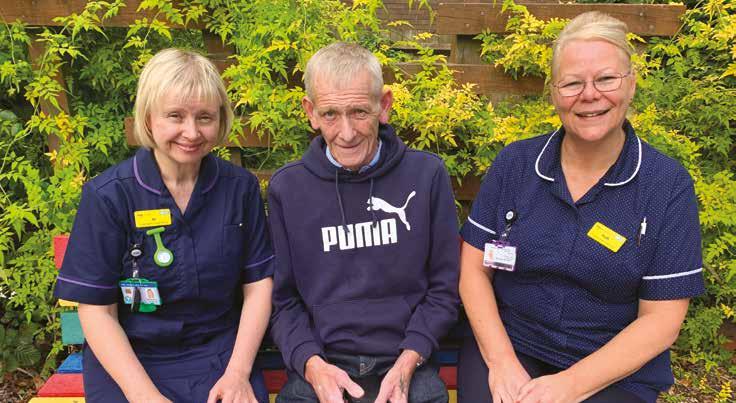
He continued: “I had my operation in June the same year and was lucky enough to be discharged just 10 days after.”
Fast forward to September, with the help of his two friends, Marlene Chapman and Joy Marita Brookes, they started their fundraising journey - a few weeks after Ronald got the all-clear.
He shared: “After coming out of the other end, I knew I wanted to raise money towards helping those suffering with cancer. But I wanted to do it locally, as I’m all about making a difference where you live.
“I asked the nurses if there are any local charities that I can contribute to, they told me about the Upper G.I Blues organisation and how they help people who are suffering from the same type of cancer that I had.
“My friends were hosting one of their regular events at the nearby community club and they said I could hold my charity raffle there. Since then, we’ve never looked back.
“The social event was a great way to celebrate
“We’ve raised the bulk of the money through the raffles. It was heart-warming to see local businesses donating prizes, which have included a range of things, including an afternoon tea, bouncy castle hires and even a driveway jet-wash!
“I’m still weak and not 100 per cent better, even mentally, but I’m taking slow steps to recovery and to try to put the weight back on. The support I have received from my community, SWB and Macmillan is keeping me going.
“I hope that my experience highlights the importance of looking out for gastro cancer symptoms and to give back to charity wherever you can.”
Jo Harvey, Trust Lead Cancer Nurse and founder of Upper G.I. Blues, said: “Myself and the cancer services team would like to thank Ronald and his friends for their generosity. This is a huge amount of money that will be used towards improving cancer services and will benefit patients being treated at the Trust.
“It’s so rewarding to see Ronald fit, well, and fundraising for the same department he was once a patient at.
“It’s very important for people to see a GP if they have the same symptoms that Ronald did, especially if they persist, get worse or do not feel normal.”
Ronald Woodall with cancer nurses from SWBH
26
SURGICAL SERVICES
News in brief from around our organisation Pulse
Much loved therapy dog Rosie passes away
It is with great sadness that we report the passing of much loved 'Pets as Therapy' dog Rosie.
13-year-old golden retriever Rosie became an instant hit with patients, visitors and the public alike as she regularly visited the hospitals for four years prior to COVID-19.
Bringing smiles to patients in critical care, stroke and renal wards alongside children's wards, Rosie was a 'Pets as Therapy' dog who had a huge impact on everyone she came in contact with.
Pets As Therapy are a national charity founded in 1983 by Lesley Scott-Ordish and now playing host to over 4,000 volunteers and their pets who provide a visiting service in hospitals, hospices, residential nursing homes, day care centres, mainstream and special needs schools across the UK.
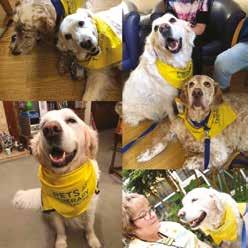
SWB celebrates Pride in Birmingham

On Saturday 24 September, colleagues from SWB celebrated Birmingham Pride, showing support for our LGBTQ+ colleagues, patients and the community by attending the event, which kicked off at 12pm in Centenary Square.
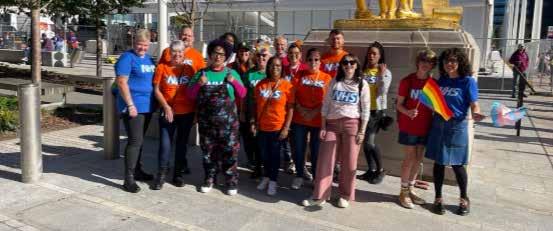
Pride is an annual event taking place globally, with towns and cities marking the occasion by hosting parades, street parties and live entertainment. Different locations celebrate at different times throughout the year.
Rowena Thomas (former Speech and Language Therapist at SWB), Pets As Therapy Volunteer and owner of Rosie said: “Everyone was drawn to Rosie as she was a
Many colleagues from SWB were in attendance; Andrew Churm, Community Nursing Matron, was one such colleague and told Heartbeat how much he enjoyed the day. He called it a “fabulous success”, noting it was well attended by SWB’s LGBT+ network, “enabling us to celebrate and embrace the diversity we have here at SWBH”.
SWB was joined by 14 partner organisations from across the West Midlands, and colleagues also brought family and friends. Andrew stated “we want to build on this year’s success and look forward to inviting even more colleagues next year.” If you’d
If you have a story you would like to appear on the Pulse page, please email a photo and a short explanation to swbh.comms@nhs.net
big fluffy bear/dog who loved everyone and everyone loved her. She had a beautiful soul and had such a calming influence on those who were struggling with being an inpatient.”
She added: "Rosie bought a lot of smiles and much joy to children, adult patients and visitors and staff also. We miss her terribly."
Patricia Hunt, Volunteer Service Manager echoed these thoughts and said: “Rosie was such a beautiful dog. She made such an impact on the wards with the patients, and I am sure helped many with their recovery being able to stroke and fuss her when she visited, and the staff will miss the visits too. Many memories of Rosie will remain with us for a long time at our Trust.”
Rest in peace Rosie.
like details of how to join the network, please contact Thomas Devaney or email swbh.lgbt@nhs.net.
Rosie
27
Dr Mark Anderson Chief Medical Officer
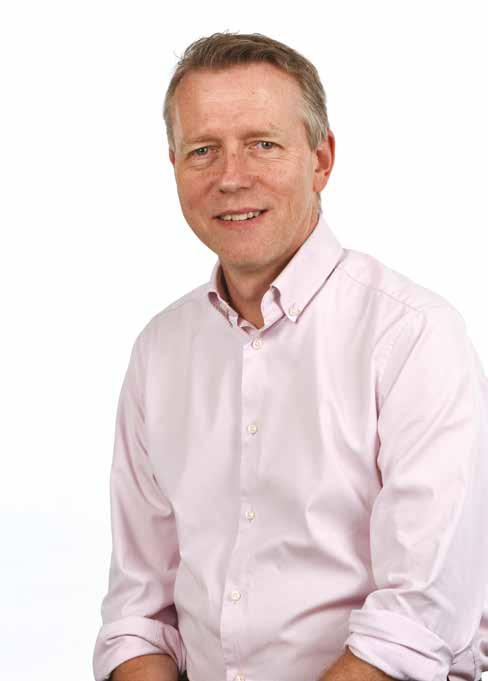
This month, we introduce Dr Mark Anderson who is stepping into the chief medical officer role, following Dr David Carruthers stepping down in August.
Mark joined the Trust in 2006, coming on board as a consultant gastroenterologist. He became endoscopy lead in 2011, and in 2013 stepped up as clinical director of scheduled care. This role came with significant responsibility, involving oversight of around seven medical specialties; Mark continued in this role for four years. In 2019, he became the deputy medical director and the responsible officer for doctor’s appraisal, revalidation and medical professional standards. He continued in these roles until September 2022, when he became the chief medical officer.
We caught up with Mark to find out his aims within the role and find out how he’s adapting to the change from clinical to leadership responsibilities.
Mark stated his first priority is to support the fundamentals of care programme, “which is a significant part of our approach to quality.”
Launched in September, fundamentals of care aims to ensure all patients receive certain fundamentals, such as appropriate nutrition, hydration, rest and dignity but also harm free care and clear patient centred communication: these fundamentals are the responsibility of the whole multi-disciplinary healthcare team.
Discussing healthcare values, Mark stated: “I’m interested in human factors and learning, and I believe in a no-blame culture. Similarly, in my role I am keen to support maternity as safety champion. I also think it’s crucial to emphasise and advocate for the principles of ‘freedom to speak up’.” These principles are relevant to his focus on safety and governance.
In the longer term, Mark referenced the ongoing construction of Midland Metropolitan University Hospital. He noted “I haven’t visited for four years, so I imagine it will be quite different now! I’m keen to visit again to see how the construction has come on.
“The hospital will have a massive impact on both staff and patients. The impact won’t just apply to the acute setting, but will also benefit our ambitions in integrated care: I think the new setting will provide us with opportunities to better link up acute care with primary and community care.”
We also asked Mark about his own goals, and how he’s adapted to his new responsibilities. Mark stated it’s been “a big culture change from carrying out primarily clinical work to primarily leadership. I’m excited about this, but
aware there will be a lot to learn. I’m in a new environment and it’s a new way of working. I can still achieve the things I want to work on, but in a new way.
“I’ve immersed myself in the role to meet the new requirements and climb that steep learning curve. But it is a great team to be joining and to build on our successes in research and in medical education. I must pay tribute to my predecessor, David Carruthers.”
Mark is keen to retain his links with the clinical setting; “I want to maintain my clinical
grounding and utilise the skills I’ve developed from my background in this new role. It’s really important to me that I don’t lose connection with the clinical environment and continue to be aware of what’s happening on the ground.
“I’m going to keep doing some endoscopy, whilst also getting out to clinical areas. Throughout my career, I’ve made it my priority to be approachable. It’s important to me that people are aware of this: if you want to talk, you can reach out and I’d be really glad to speak with you.”
Dr Mark Anderson
28
28
Wave goodbye to…
From teaching lifesaving techniques to travelling the world, this month we say a fond farewell to Senior Sister Dawn Martin for her 37 years in Nursing.

From a young age Dawn always knew she wanted to help people, but it wasn’t until a chance encounter that she finally set off on her journey into her nursing career.
Sharing her memories, Dawn said, “When I was young, all I wanted to do was help people, that was the constant. Initially I wanted to join the police and I had my sights set on joining The Metropolitan Police in London. But I was lucky enough to be offered a week long stint in a cottage hospital through a school work placement and I was hooked. I was supported to join a hospital in London and off I began on my nursing career.”
“Whilst it might sound somewhat cliché, it really was the people who kept me interested in nursing, the interactions and experiences that we were able to share, and knowing that I’m able to make a difference to people’s lives when they’re at their most vulnerable.”
Sharing her journey to her role in the resuscitation team, Dawn said, “I spent over 10 years in A&E and spent a lot of time in resus, so I was given the opportunity to become an instructor so I thought I’d give it a go.
“I really enjoy supporting others to learn, passing on the knowledge and giving others the
confidence to do what’s right. The majority of people I train have the knowledge, but they just need a little support to get the confidence in them to be able to step in when is needed and let their training take over.
“Nursing is an incredibly privileged role; you get lots of opportunities to interact with people and patients, make a difference and leave a mark, whether it’s getting hands on with a
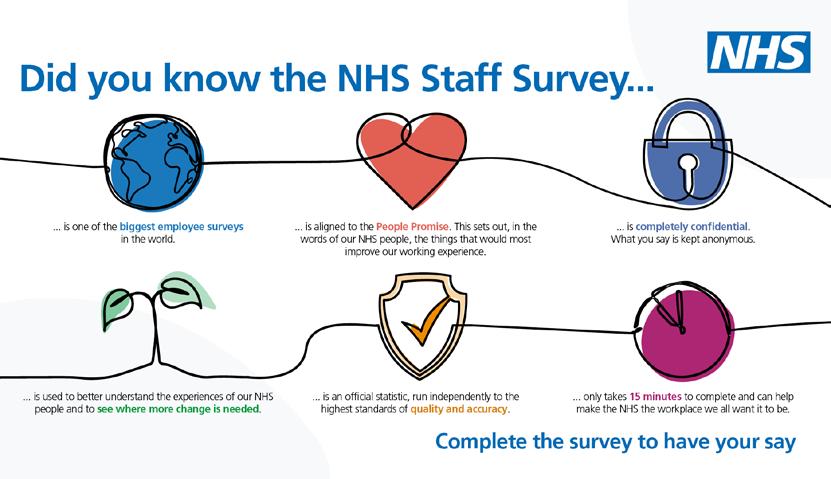
procedure or simply providing some support with a listening ear.
“It still makes me emotional, nursing is full of highs and lows, but the team you work with has a huge impact on your life, thankfully mine have always been fantastic.
“Thinking about some of my memorable moments, there have been a few over the years. I became a senior sister in a transplant unit in Oxford, I setup a dialysis unit, and I managed to get a degree in management whilst working and when I’d just had a baby! However, the real memorable moments have been when I’ve seen my patients recover from major surgery, seeing them improve and when they come back to say thank you. “
“I always vowed not to be a boring 40yr old, so now that I have some freedom I’m going to take the opportunity to reinvent myself. Whilst I’ll still like to do some education, I’ll be looking to see how I can mix in some volunteering abroad. I have started learning Italian and I’ve got my sights set on touring Italy. I just want to see where the world takes me.”
For those colleagues looking to take up a role in resuscitation, Dawn had some parting advice. She said, “Resus and nursing as a whole is a privilege, it's tough but you need to look for the good in it. I wouldn’t change a thing, it’s an amazing career and I’d wholeheartedly encourage people to explore it.”
Dawn Martin
Dawn Martin Senior Sister
Letters, of less than 200 words please, can be sent to the Communications Department, Trust Headquarters, Sandwell Hospital or by email to swb–tr.SWBH–GM–Heartbeat@nhs.net
YOUR RIGHT TO BE HEARD
Will we get continue to get wellbeing support?
Dear Heartbeat,
During the peak of the pandemic the organisation invested heavily in well being for staff. However, it seems to me that everything has tailed off, now we are living with covid and in recovery.
First there was a big drive to refurbish rest areas for staff and for those departments that had no rest areas, there was talk of finding suitable spaces. A year later, people in my team still don’t have a good space to relax and eat or even have a drink away from the daily pressures.
Then there were the away days paid for by the Trust. When we had ours it was truly one of the best things anyone could offer us. But now my manager says there is no longer any money available.
What is going on?
Just because the pandemic is over does that mean the provision for staff is over too?
Anonymous
Dear Anonymous,
Our rest room refurbishment programme is continuing and we are sorry that it is taking longer than we would like. The list of requests has been broken down into Estates Works (e.g. decorating, shelving, blinds), equipment, refurbishment of non-Trust properties and requests for additional space. Our Estates provider, Equans, are being instructed to review cost and subsequently carry out the Estates works and there are a set of colour/mood boards aligned to wellbeing that departments can choose from.
We are reviewing the non-Trust properties as we need to be clear on the terms of the lease to determine what we can and can’t do, or who is responsible for what.
The purchase of equipment is co-ordinated through the procurement team who are contacting the relevant departments in order to review the rooms themselves, so that we can make sure that the equipment is appropriate for the designated space (e.g. fire precautions/handwashing facilities).
We have four requests for additional space that is not currently available which is taking a bit more time to resolve as we seek to identify spare or underused areas.
The away days were for a specific one off Covid recovery initiative that ended in March 2022. It was expected that teams would use their local budgets to carry on these away days as desired. That said, we have had many requests to carry on these events and we are reviewing whether we re-introduce them again for the remainder of this financial year, with some additional guidelines. Look out for more on this through Trust comms.
We have lots of other support for colleagues available including our SWBH Benefits that has a range of everyday discounts, access to wellbeing hubs for free treatments along with specialist support from the occupational health team. We are also preparing a package of cost of living support
initiatives, information on where colleagues can identify help and support with financial issues, and improved 24 hour hot food provision.
Please be assured that despite our current financial challenges, we remain committed to supporting our colleagues with wellbeing support. If you have any other ideas that you would like the Trust to consider, please do get in touch.
Best wishes
Dinah McLannahan, Chief Finance Officer
Will senior leaders follow values?
Dear Heartbeat
I was interested to read that our new values have been agreed as ambition, respect and compassion.
What matters is, how will the big people in the organisation make sure we follow our values? Many times I have smiled and said hello to senior managers who have completely blanked me.
We should not need to be told how to behave. It costs nothing to be kind.
Anonymous
Dear Anonymous,
Thank you for your letter. I am pleased you recognise the importance of our new Trust values. The values are accompanied by a behavioural framework that sets out a list of behaviours that we expect all Trust staff, including our senior managers, to follow. It allows for respectful challenge at times when these values are not being lived up to. Our PDR and recruitment processes will incorporate the values so that we will all be assessed on the way we do our work as well as what we achieved.
We have spent a considerable amount of time engaging with colleagues right across the organisation on what our values should be. Colleagues have had an opportunity to participate in workshops, share thoughts on our organisation’s best features, select values from a range of options and come up with the right behaviours that we will hold each other to account over. More than 1200 people have taken part which means that our new values are truly in line with staff opinion, and not simply some aspirational words that have been developed by a few people in a darkened room.
Kind regards
Frieza Mahmood, Chief People Officer
30
Richard talks about: The Seven Fundamentals of Care Standards
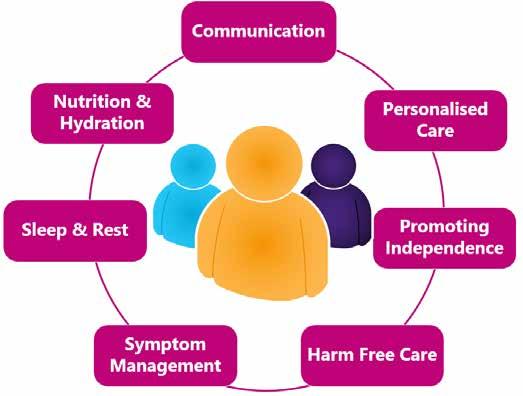
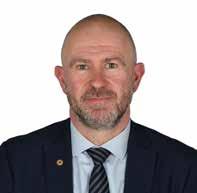 Richard Beeken, Chief Executive
Richard Beeken, Chief Executive
RICHARD'S LAST WORD
I was delighted to chair the Fundamentals of Care launch earlier this month and I was particularly pleased to see such a range of people in the room, representing different teams and professions from across the Trust. This is and will be, a multi-disciplinary endeavour.
There was a great buzz in the room as people spent time discussing with one other how to ensure the care we provide is consistently good or outstanding. So many of you have a real passion for making these improvements and I know through your commitment that we will make a difference to patients and their families.
There were several powerful moments during the launch event: The daughter of one of our patients shared her story through a film, describing the experiences of her mum that was at times particularly harrowing. Elaine’s anxiety and distress were evident and she was particularly concerned that that without being by her mum’s bedside, she wasn’t confident that her mum was being looked after well. Some shocking lack of personal care and dignity were evident throughout her inpatient spell with us.
We also heard from young carers, people who are hard of hearing and those who are visually impaired. All of these people challenged our attitudes, emphasising the importance of treating each patient as an individual, with bespoke needs and wishes for their care. Our care should be needs led and person centred. Doing this doesn’t always take more time or effort or money.
No matter what your role within our organisation, you can have a significant impact on patient care and on the experiences of relatives and friends. We must continue to ask ourselves whether we are treating people in the way that we would like our own relatives to be treated. Through our regular Pulse surveys only about half of our staff would recommend this organisation as
a place to receive care. This is our organisation and the people we serve are from our communities. That is something that should concern us all. We want to be proud of every corner of our organisation and to have confidence that everyone who accesses our services will benefit from the same high standards of treatment, provided with respect and compassion.
I heard loud and clear that you want the tools and resources to do your jobs well and to be empowered to make changes to your services to improve patient’s experiences without having to wait for a long chain of approvals. Our chosen approach to continuous quality improvement will give you just that.
Staffing challenges can make it hard for you to provide care at the right standards, but I am really encouraged that many of our vacancies are on track to being filled, which will ease the burden on our substantive staff. We also want to encourage you to make those small improvements, noticing when what we do is causing upset, and really think about how relatives and patients can feel more confident in the care that we provide. We all come to work to give of our best. We all came into the NHS to do the right thing for our patients. It can become easy to live with things that are not up to standard. Don’t be the person that walks past when you see something that isn’t right. Do what you can to make a change and you will feel good about the impact you have had on someone else.
I have great optimism about our Fundamentals of Care framework because I can see the enthusiasm and energy from right across our organisation. Yes, it will be tough. There will be times when the small improvements we want to make can take too long and we will feel like giving up. But, I know that by supporting each other in working towards the same goals – to deliver good or outstanding care – we can overcome those challenges.
31
Midland Met zip wire event scheduled for 1
July 2023 - sign up now!
YOUR TRUST
Dr Nick Makwana, Consultant Paediatrician and Group Director for Women and Child Health is taking part in the zip wire to raise money for the campaign.
He said: “We know that the hospital build itself is paid for, but what we really want are those special touches which will make a difference to patients and staff. When I was thinking about why would I do this, the thing that really stood out for me was to make a positive environment for our young children and people that actually suits them and that they can get better in.
@SWBHCharity To donate to the Your Trust Charity text “SWBH16 £5” to 70070
After much anticipation, Your Trust Charity is excited to announce its flagship fundraising event – the Midland Met zip wire – will be taking place on the weekend of 1 –2 July 2023.
The money raised from the event will help fund the eagerly anticipated Midland Metropolitan University Hospital scheduled to open for patients in Spring 2024.
“As part of Your Trust Charity’s biggest ever fundraising event, we will be offering you the opportunity to descend 220 metres on a zip line at Midland Met,” said Johnny Shah, Head of Your Trust Charity.

“With panoramic views over Birmingham, you will reach speeds of up to 35mph as you enjoy one of the most exhilarating adventures of your life all whilst raising much needed funds for Your Trust Charity.
“With a fundraising target of just £250 per participant, this is an ideal opportunity for thrill-seekers to enjoy a breath-taking, adrenaline-packed adventure with every single penny raised will go towards our £2m target and more importantly, the making of your new hospital, Midland Met.”
“The kind of things the money we raise will be paying for are the artwork on the walls, and the garden areas which will be a really great space for children and young patients to get some time away from the
ward. As we know, when you have that space and fresh air, it helps your wellbeing and helps you get better quicker.”
With spaces filling up fast, Johnny is urging all interested parties to sign up fast.
“Whether you’re a clinical colleague or non-clinical colleague, I’m urging everyone who is undecided to sign up now to be part of one of our biggest fundraising events ever before it is too late!”
Should you want to get involved and find out more please visit https:// connect2.swbh.nhs.uk/midland-metfundraising-campaign/upcomingevents/. If you would like to make a donation to support those taking part in the zip wire challenge, please visit https:// donorbox.org/your-trust-charity
September 2022 staff lottery results
1st £157.25
Teji 2nd £94.35
3rd £62.90
Don’t forget that Your Trust Charity lottery costs just £1 a month and anyone who works for the Trust can join. Payment is deducted from your wages each month. To take part email johnny.shah@nhs.net.
Colleagues have the chance to descend 220 metres on the MMUH zip line
- 2
Asha
Karen Burkitt
Amy Harper
CHARITY




 The pulse of community health, Leasowes, Rowley Regis, City Hospital, Sandwell General and the Midland Metropolitan University Hospital
The pulse of community health, Leasowes, Rowley Regis, City Hospital, Sandwell General and the Midland Metropolitan University Hospital













 CORPORATE AND GENERAL NEWS
CORPORATE AND GENERAL NEWS




 Chief Integration Officer Daren Fradgley
Cardiology Matron Jody Stubbs
Chief Integration Officer Daren Fradgley
Cardiology Matron Jody Stubbs






















 Colleagues at the launch of the Fundamentals of Care framework.
Colleagues at the launch of the Fundamentals of Care framework.





















 Richard Beeken, Chief Executive
Richard Beeken, Chief Executive
